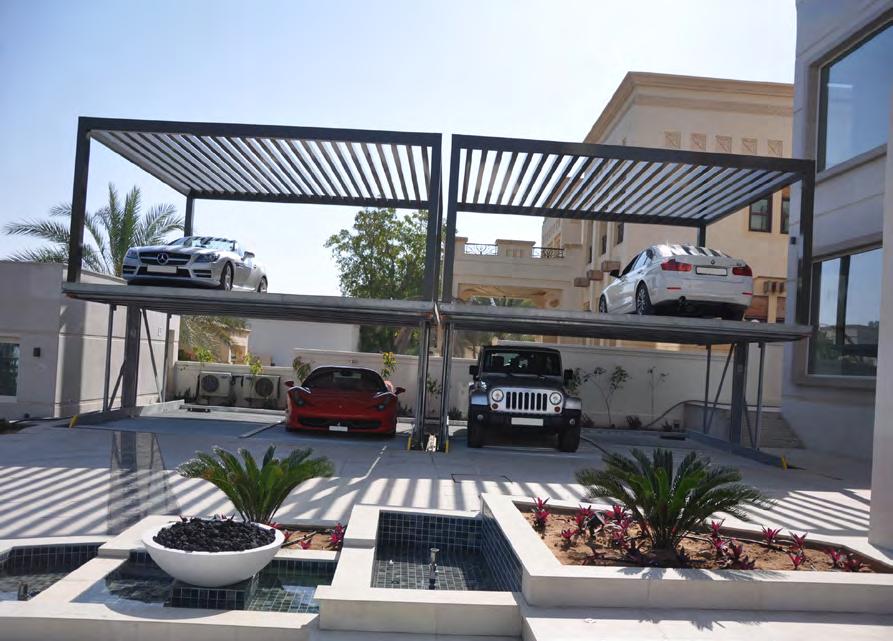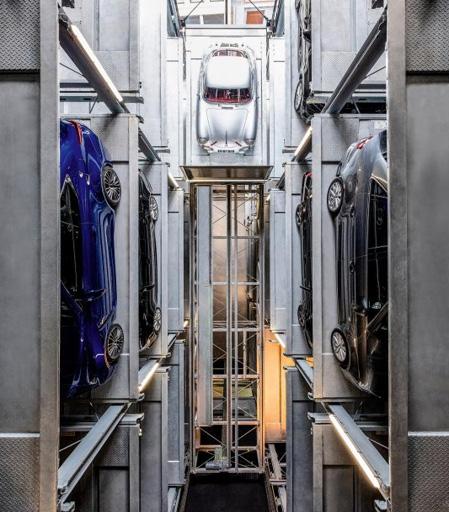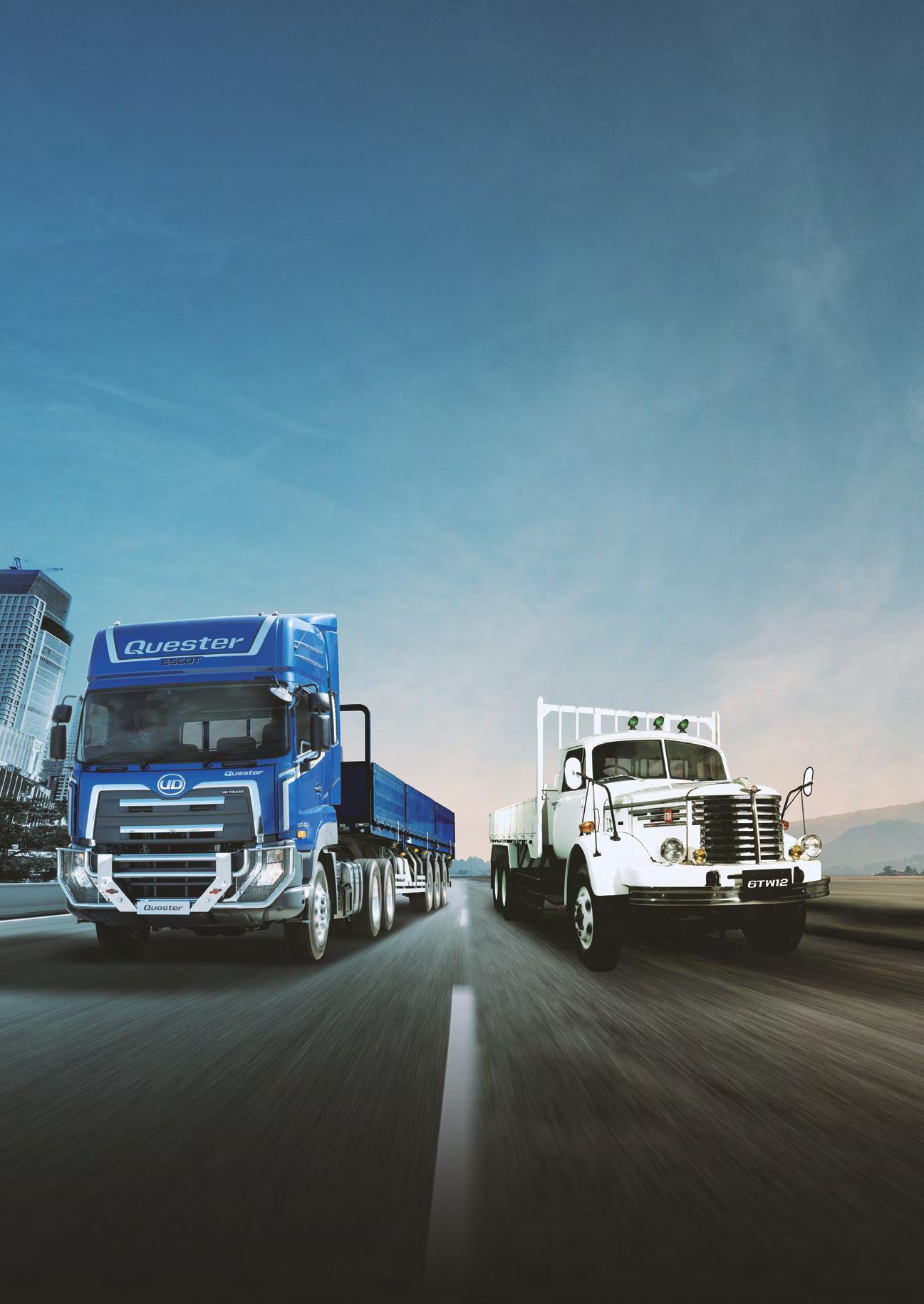CONNECTING TRADE PROFESSIONALS WITH INDUSTRY INTELLIGENCE
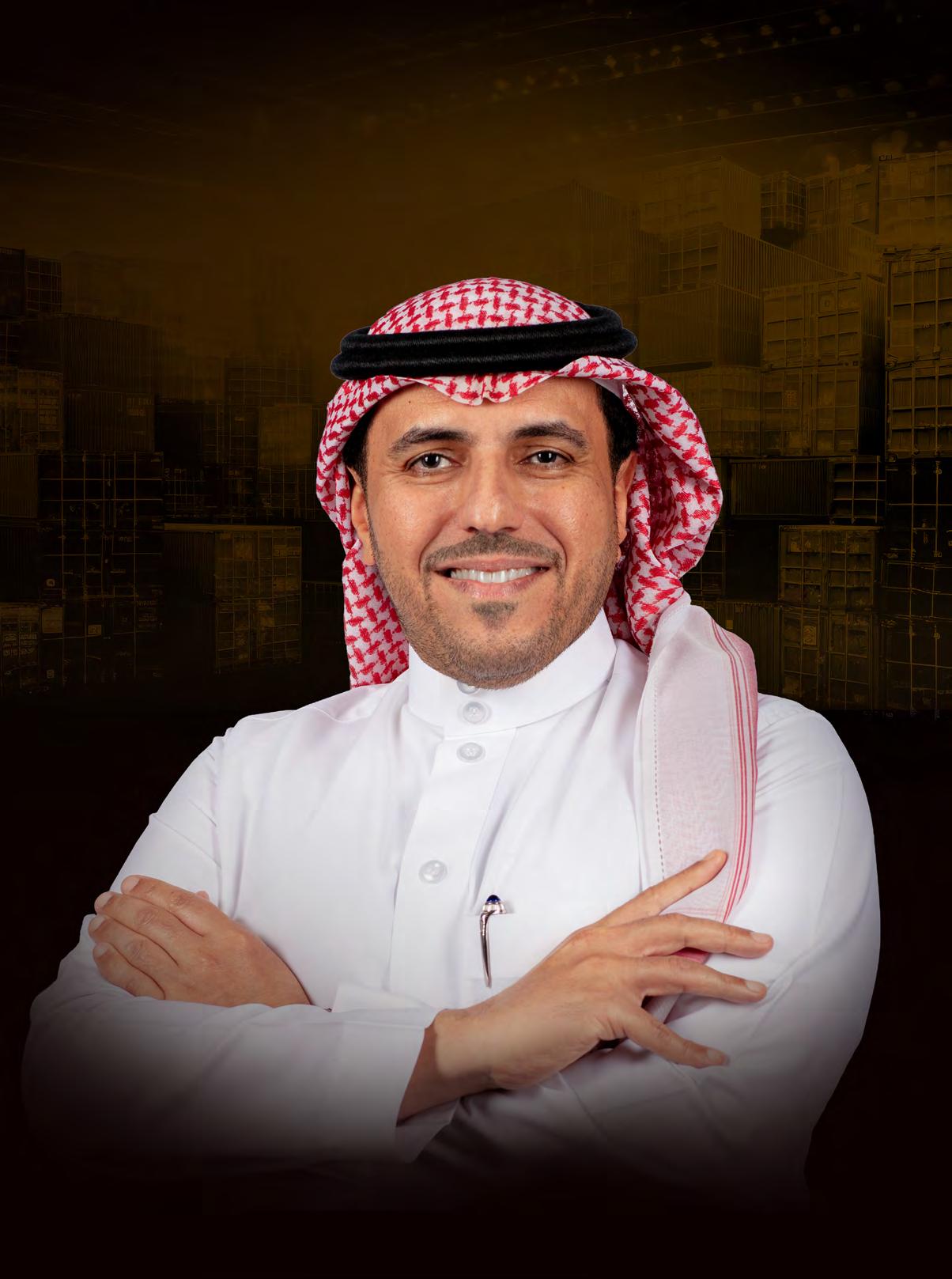
Abdulaziz Busbate: Powering DHL’s momentum across 18 dynamic markets

CONNECTING TRADE PROFESSIONALS WITH INDUSTRY INTELLIGENCE

Abdulaziz Busbate: Powering DHL’s momentum across 18 dynamic markets
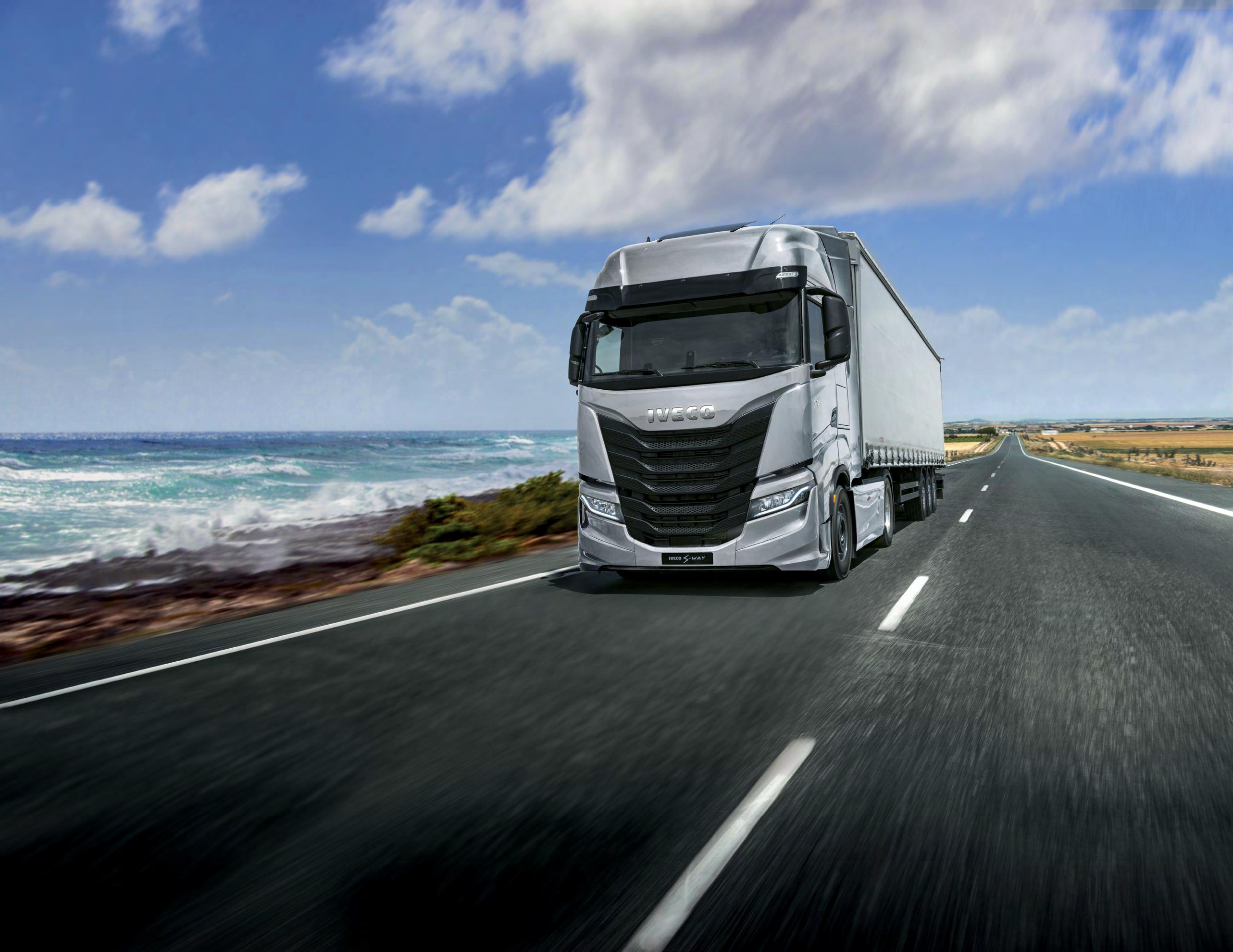
New IVECO S-Way: high technology and efficiency on all missions
A wide choice of Euro III / V diesel engines, delivering class-leading power from 360 hp to 560 hp Euro III / 570 hp Euro V and superior fuel economy. 12-speed HI-TRONIX automated transmission with the most advanced technology in its category, electronic clutch and best-in-class torque-to-weight ratio. Full range of fuel-saving devices, such as anti-idling feature, EcoSwitch, Ecoroll and Smart Alternator. Top levels of comfort and safety, with a completely redesigned and reinforced cab, featuring enhanced direct visibility and enlarged cab livability.
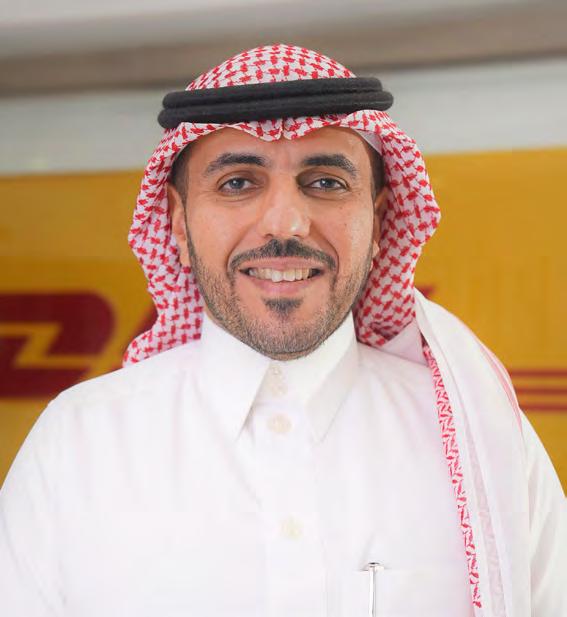
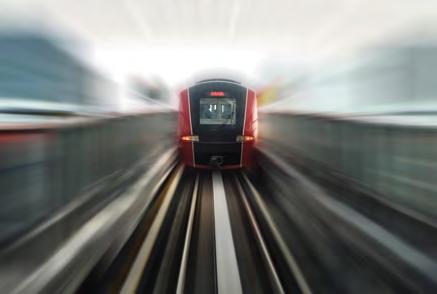
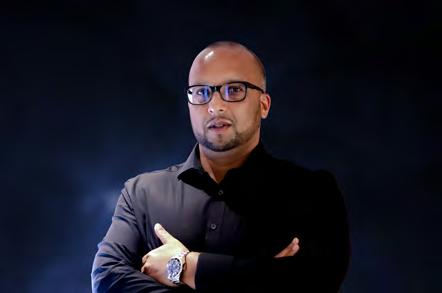
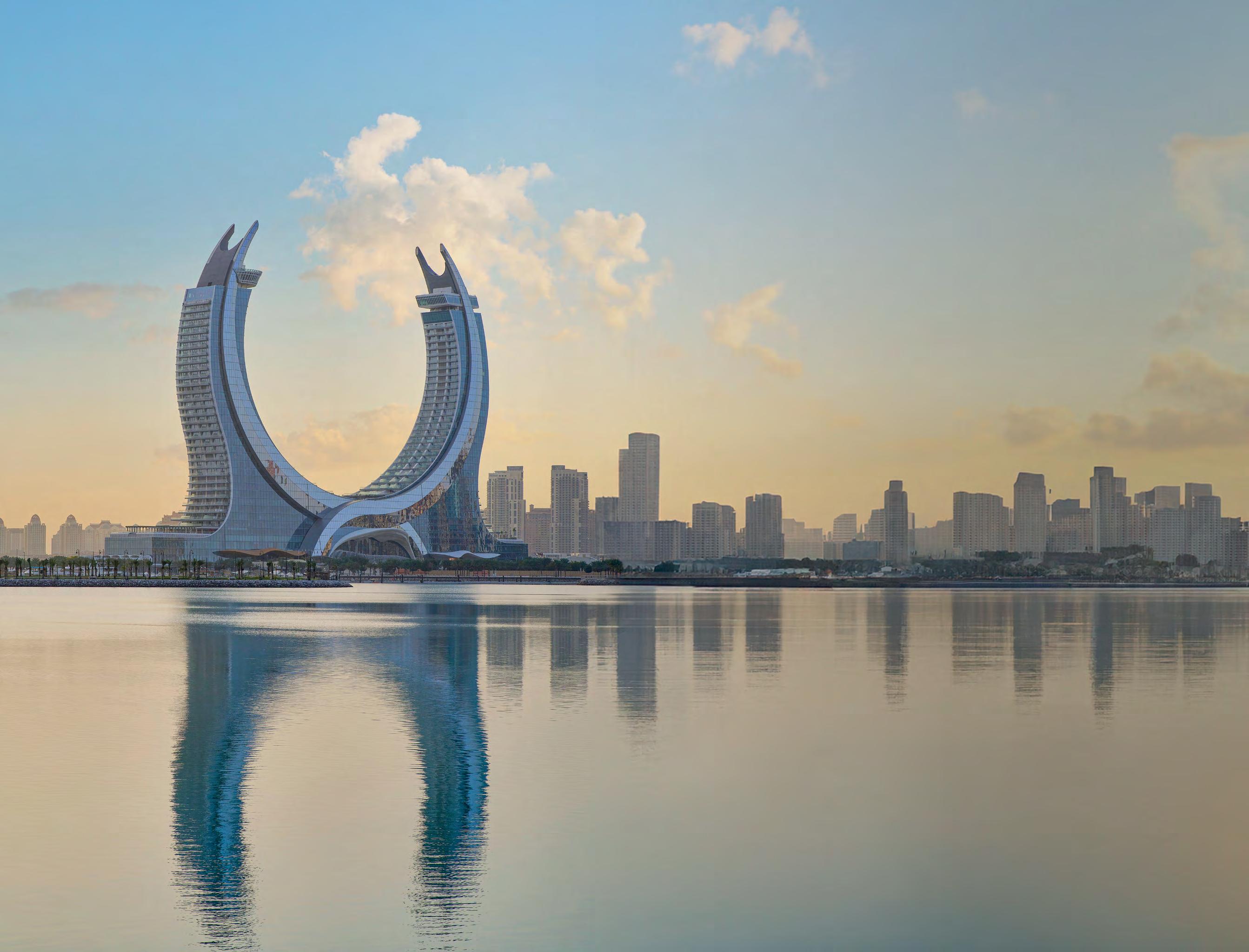
Nestled by the coast of Lusail sits the splendor of Raf es and Fairmont Doha, where luxury is rooted in even the smallest details. Open the doors to mesmerizing hospitality and make memories in a world of sophistication.

CONNECTING TRADE PROFESSIONALS WITH INDUSTRY INTELLIGENCE
CONNECTING TRADE PROFESSIONALS WITH
CEO
Wissam Younane wissam@bncpublishing.net
Managing Director
CEO
Rabih Najm rabih@bncpublishing.net
Wissam Younane wissam@bncpublishing.net
Group Publishing Director
Director
Joaquim D’Costa jo@bncpublishing.net
Rabih Najm rabih@bncpublishing.net
Commercial Director
Group Publishing Director
Andrea Mocay andrea@bncpublishing.net
Joaquim D'Costa jo@bncpublishing.net
Editor
Editor-in-Chief
Aya Zhang aya@bncpublishing.net
Vibha Mehta vibha@bncpublishing.net
Digital Reporter
Managing Editor
Reeba Asghar reeba@bncpublishing.net
Kasun Illankoon kasun@bncpublishing.net
Creative Lead
SUBSCRIBE
subscriptions@bncpublishing.net
subscriptions@bncpublishing.net
PO Box 502511 Dubai, United Arab Emirates P +971 4 4200 506 | F +971 4 4200 196
For all commercial enquiries, contact jo@bncpublishing.net T +971 50 440 2706
PO Box 502511 Dubai, United Arab Emirates P +971 4 4200 506 | F +971 4 4200 196
Christian Harb chriss@bncpublishing.net
Design Christian Harb
Junior Art Director
Marketing Executive
Rizaldi Febrian
Aaron Joshua Sinanbam aj@bncpublishing.net
Marketing Executive
Digital Media Producer
Aaron Joshua Sinanbam aj@bncpublishing.net
Alexander Bungas
Videographer
Eduardo Buenagua
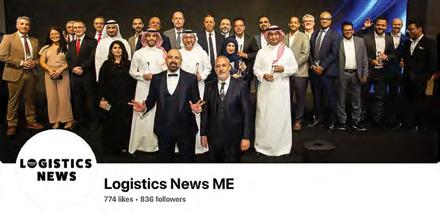
All rights reserved © 2025. Opinions expressed are solely those of the contributors. Logistics News ME and all subsidiary publications in the MENA region are officially licensed exclusively to BNC Publishing in the MENA region by Logistics News ME.
For all commercial enquiries, contact jo@bncpublishing.net T +971 50 440 2706 All rights reserved © 2023. Opinions expressed are solely those of the contributors.
No part of this magazine may be reproduced or transmitted in any form or by any means without written permission of the publisher.
Logistics News ME and all subsidiary publications in the MENA region are o cially licensed exclusively to BNC Publishing in the MENA region by Logistics News ME.
Printed by United Printing and Publishing | upp.ae
No part of this magazine may be reproduced or transmitted in any form or by any means without written permission of the publisher.
Printed by United Printing and Publishing | upp.ae
Images used in Logistics News ME are credited when necessary. Attributed use of copyrighted images with permission. All images not credited courtesy Shutterstock.
In addition to our print edition, we’re bringing you all sorts of industry news on our web mediums. We’re looking forward to interacting with our readers on all of our social media and web platforms. See you on the web!
addition to our we’re bringing you all sorts of industry news on our web mediums. We’re looking forward to interacting with our readers on all of our social media and web platforms. See you on the web!
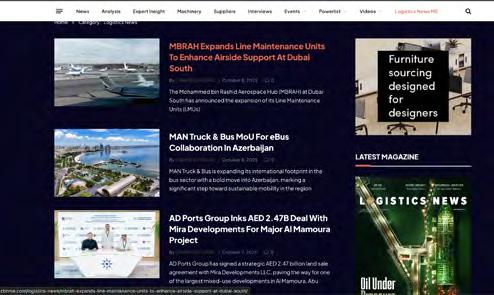
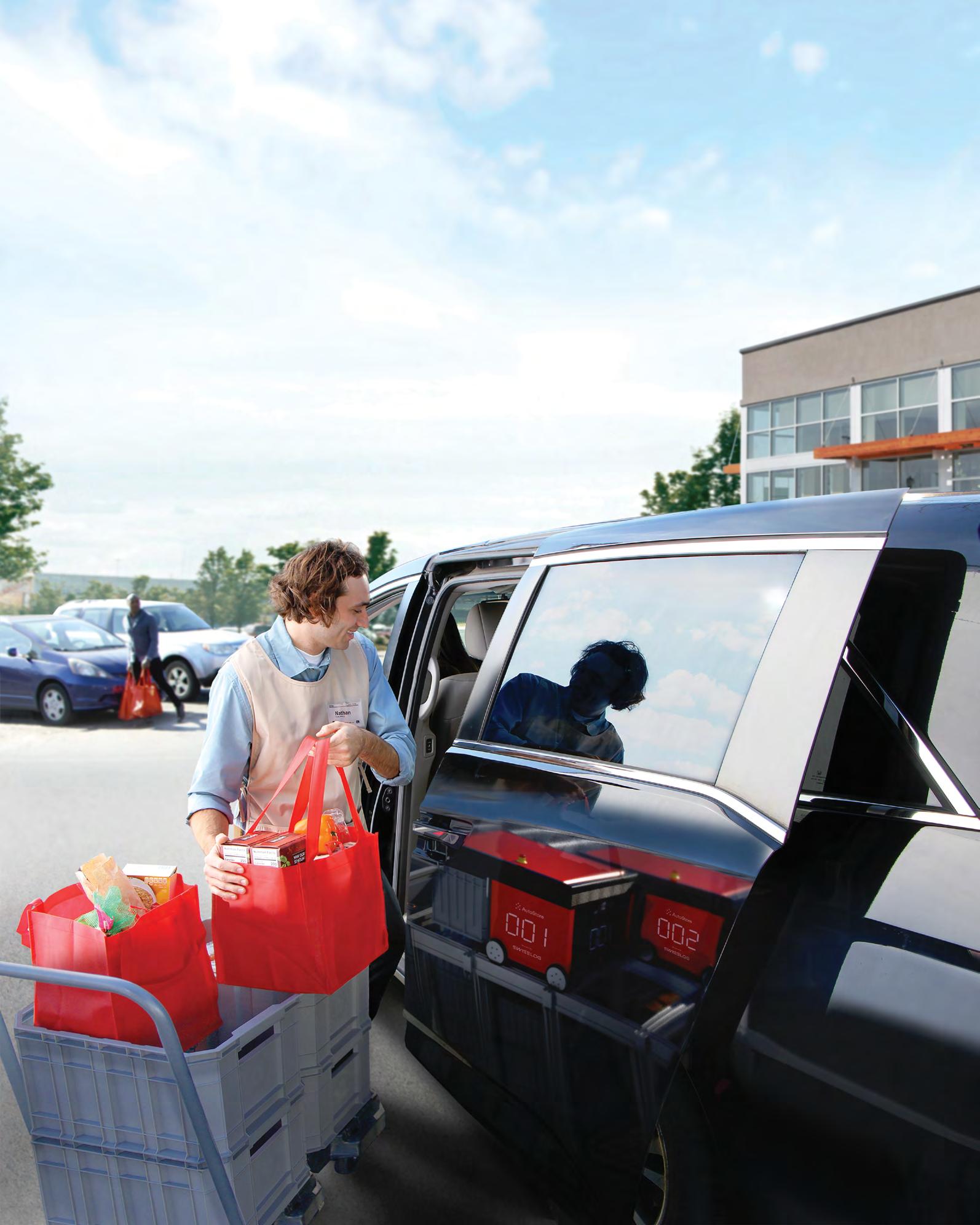
On the 16th of September, we had the privilege of celebrating some of the most exceptional players in the logistics and transport industry. Watching the winners take the stage recognised for all the hard work they have put in was a very fulfilling moment for me. I felt genuinely happy to see them receive a small return for the immense impact they’ve made for the people of the region.
This industry doesn’t chase the spotlight. It runs on results. It’s built on early mornings, late nights, tough calls, tight deadlines, and constant problemsolving. What we celebrated wasn’t just performance, it was resilience, leadership, and the kind of execution that keeps economies moving.
The awards aren’t about the trophy. They’re a symbol of everything it takes to keep this sector running. A moment to reflect on the real value created by people who show up and deliver, day after day.
As a publication, it’s a privilege to witness these moments and tell these stories. They remind us why this work matters, and why we continue to do it.
Here’s to your success, and to what comes next.

Aya Zhang Editor aya@bncpublishing.net
Xiaoyue (Aya) Zhang xiaoyuezhangg






























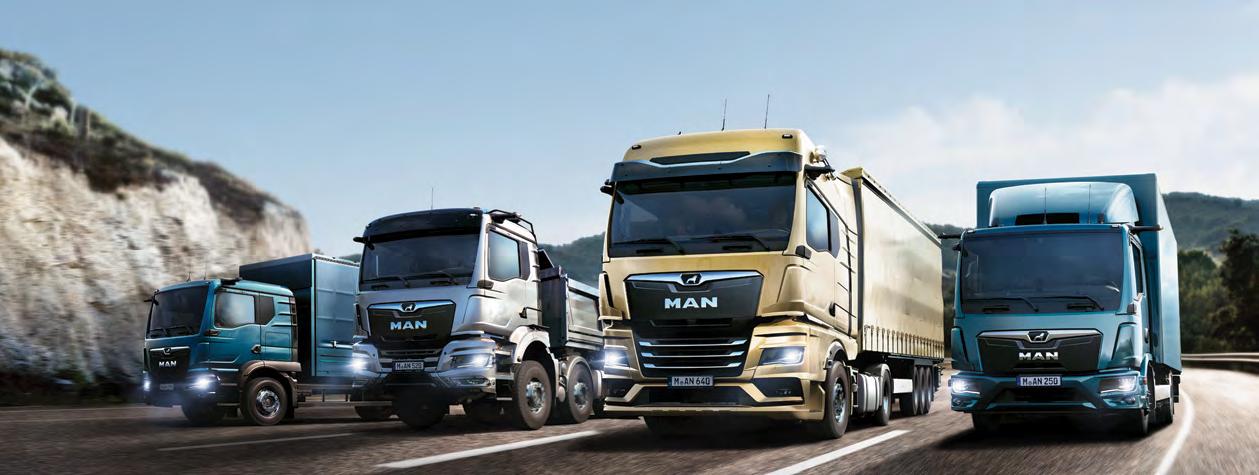












































AD Ports Group, a leading global facilitator of trade, logistics, and industry, has signed a landmark land sale agreement with Mira Developments LLC for the development of one of the largest mixed-use communities in Al Mamoura, Abu Dhabi.
Valued at AED 2.47 billion, the strategic agreement covers a prime land parcel within AD Ports Group’s expansive 16-squarekilometre Town Centre Area, located along the Dubai–Abu Dhabi highway. The development aims to transform the district into a fully integrated, largescale community, reinforcing Abu Dhabi’s urban development ambitions and sustainable growth agenda.
Construction on the project is scheduled to commence within the next 12 months, with full completion targeted within 10 years from the agreement’s effective date of 29 September 2025. This timeline reflects the partners’ strong commitment to execution and the project’s significance as a key catalyst for long-term urban transformation in the emirate.
The agreement represents a significant milestone in AD Ports Group’s diversification strategy, reinforcing its position as a forward-looking, multi-sector organisation. By unlocking value from its extensive land portfolio, the
Group strengthens its financial standing while enabling the accelerated implementation of its master plan for the Town Centre Area.
The transaction also highlights AD Ports Group’s growing appeal to strategic investors and developers, while allowing the redeployment of capital into high-impact infrastructure, logistics, and trade facilitation initiatives—core pillars of the Group’s long-term vision.
This transformative development will significantly elevate Abu Dhabi’s real estate landscape, introducing a premier destination that blends residential, commercial, and leisure
components. Anchored by one of the region’s largest shopping malls, the master plan also includes a modern business complex, luxury hotels, worldclass golf courses, and a suite of educational institutions, including universities and schools.
More than a real estate initiative, the project will create a vibrant, balanced, and dynamic urban hub, transforming Al Mamoura into a destination where business, education, recreation, and community life can thrive in harmony. It represents a critical step in establishing one of Abu Dhabi’s key districts as a model for next-generation urban living.
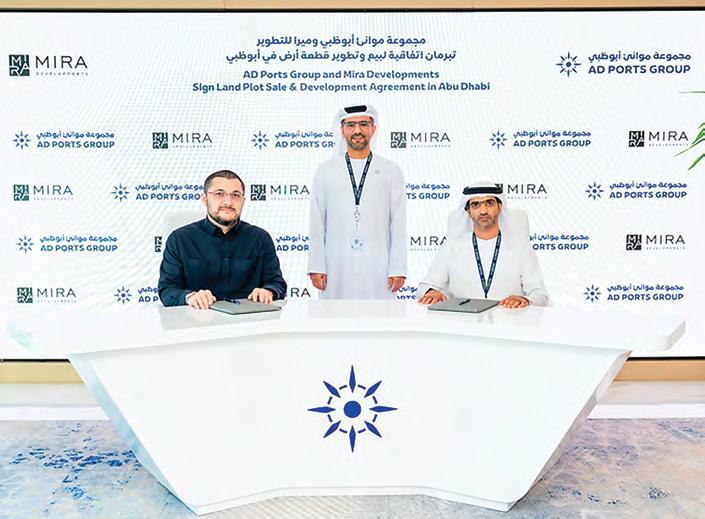
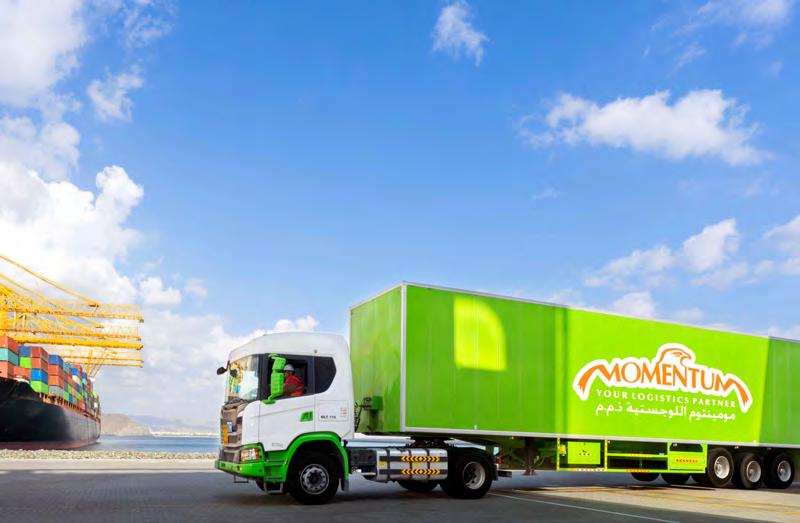
Gulftainer, a UAE-based global provider of end-to-end supply chain, logistics, and multi-purpose port solutions, is playing a pivotal role in Sharjah’s transformation into a leading multimodal logistics hub, delivering scalable, seamless logistics solutions that enable uninterrupted trade across the UAE, the inner Gulf, and international markets via Khorfakkan Commercial Terminal.
With a strong regional footprint and five decades of operational expertise, Gulftainer manages key logistics assets including multi-purpose ports and terminals, inland transport networks, and integrated logistics hubs. As the UAE continues to enhance connectivity through major infrastructure projects like Etihad Rail, Gulftainer is strategically positioned as a critical partner to accelerate development of integrated logistics capabilities to drive greater supply chain efficiency.
Sharjah is uniquely positioned as the emirate with infrastructure and population on both the eastern and western seaboards of the UAE, giving it a
strategic geographic advantage. By enhancing multimodal connectivity, across sea, land, and soon rail, Sharjah is emerging as a key logistics and transportation hub for regional and global trade.
The newly launched Sharjah ICD – the UAE’s first bonded inland container depot, and K-Flow – newly developed integrated logistics facility within the bonded zone of Khorfakkan Commercial Terminal, further enhance Sharjah’s position as the first gateway into the UAE and the wider region, making it a major milestone in Gulftainer’s transformation journey.
Farid Belbouab, Group CEO of Gulftainer, said: “As global supply chains demand greater connectivity, we continue to invest in multimodal logistics covering sea, land, and rail. We are developing integrated hubs that facilitate seamless cargo movement from ports to inland destinations, improve cargo velocity, and offer customers greater reach and flexibility in their logistics operations.
“Our multimodal expansion will serve as a powerful driver of Gulftainer’s continued growth. The future of logistics is integrated, intelligent, and interconnected across land, sea, and rail and Gulftainer is ready to lead the way.”
The new facilities provide vital multimodal connectivity between seaports and inland markets. Together, these smart, scalable hubs form the foundation of a next-generation logistics ecosystem—fully aligned with Gulftainer’s vision for a future-ready, resilient supply chain network.
National Industries Park (NIP), DP World’s industrial hub in Dubai, has secured more than AED 1 billion in new projects so far this year, underlining strong investor confidence in the emirate’s growing industrial base.
Between January and September, NIP leased over seven million square feet of land, with the majority allocated to greenfield projects that will fuel new manufacturing capacity. The surge in demand takes NIP’s tenant base past 400 companies, together supporting more than 24,700 jobs.
New customers this year include Danube Building Materials, LT Foods Middle East and Trilogy Fab Trailers Manufacturing among others. The investments add to the park’s strong performance in 2024, when new customer registrations nearly doubled year-on-year.
Abdulla Al Hashmi, Chief Operating Officer, Parks & Zones, DP World GCC, said: “Nationwide value added in manufacturing is projected at AED 160 billion in 2025, with output rising steadily under supportive industrial agendas. NIP’s performance highlights Dubai’s position as a hub for advanced manufacturing and the strong flow of greenfield projects demonstrates investor
confidence in our ability to help businesses scale quickly, creating jobs and driving industrial growth.”
Demand is being driven by the construction sector, automotive, electronics and food manufacturing, as businesses expand to serve Dubai’s growing population and large-scale infrastructure projects.
To support its expanding customer base, NIP is strengthening its customer-first approach through upgraded digital systems, a refreshed brand identity and targeted regional outreach to attract premium investments and drive sustainable growth.
According to a 2023 Economic Impact Study conducted by Ernst & Young (EY), NIP contributed 17% of Dubai’s industrial output. With new facilities set to become operational, the park is expected to create more indirect jobs and accelerate manufacturing growth across the UAE.
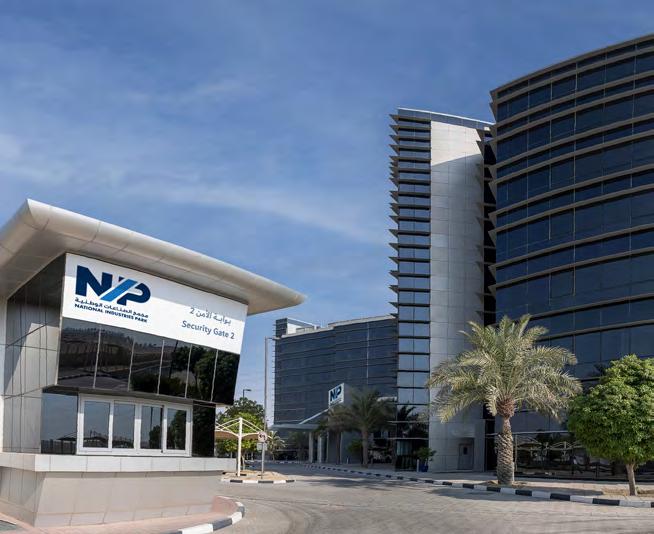
NIP forms part of DP World’s flagship assets in the UAE, including Jebel Ali Port and Jebel Ali Free Zone. Canada’s CDPQ and Saudi Arabia’s Hassana Investment Company hold equity stakes in the three assets, reflecting strong international investor confidence in Dubai’s trade and industrial ecosystem.
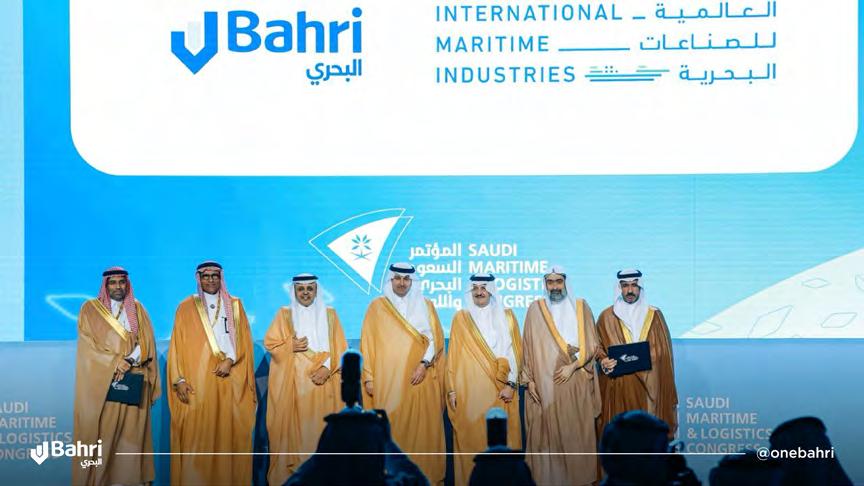
Bahri, the Kingdom’s leading shipping and logistics provider, announced the first order of six dry bulk carriers, from International Maritime Industries (IMI). This milestone marks the launch of Saudi Arabia’s first large-scale shipbuilding project, reinforcing the Kingdom’s ambition to create a globally competitive maritime ecosystem under Vision 2030 and the support of the Saudi Inc. initiative, which aims to enhance integration among major Saudi companies and promote the localisation of supply chains.
The newbuild vessels will be constructed at IMI’s state-ofthe-art shipyard in Ras Al-Khair, the most advanced fullservice maritime facility in the MENA region.
Eng. Ahmed Ali Al-Subaey, CEO of Bahri, said: “This agreement marks a strategic milestone for Bahri and a defining moment for the maritime industry in the Kingdom. Through our partnership with International Maritime Industries to launch the first large-scale national shipbuilding program, we are not only modernising our
fleet but also laying the foundations for a sustainable and globally competitive maritime sector. The construction of these new carriers will enable us to expand and elevate our service level into strategic markets, enhance the resilience of supply chains, and deliver long-term value to our customers and stakeholders, fully aligned with the ambitious objectives of Saudi Vision 2030.”
This agreement reflects Bahri’s commitment to strengthening Saudi Arabia’s maritime industry, supporting the local economy, and contributing to the creation of a new supply chain ecosystem that enhances the Kingdom’s global trade competitiveness.
Worth noting that the new geared Ultramax vessels are designed to deliver significant operational flexibility and efficiency. With their ability to access ports with limited infrastructure, they enable Bahri Dry Bulk to expand into niche markets and emerging trade routes. This adaptability reduced exposure to market volatility while enhancing resilience, competitiveness, and sustainability in a rapidly evolving industry.
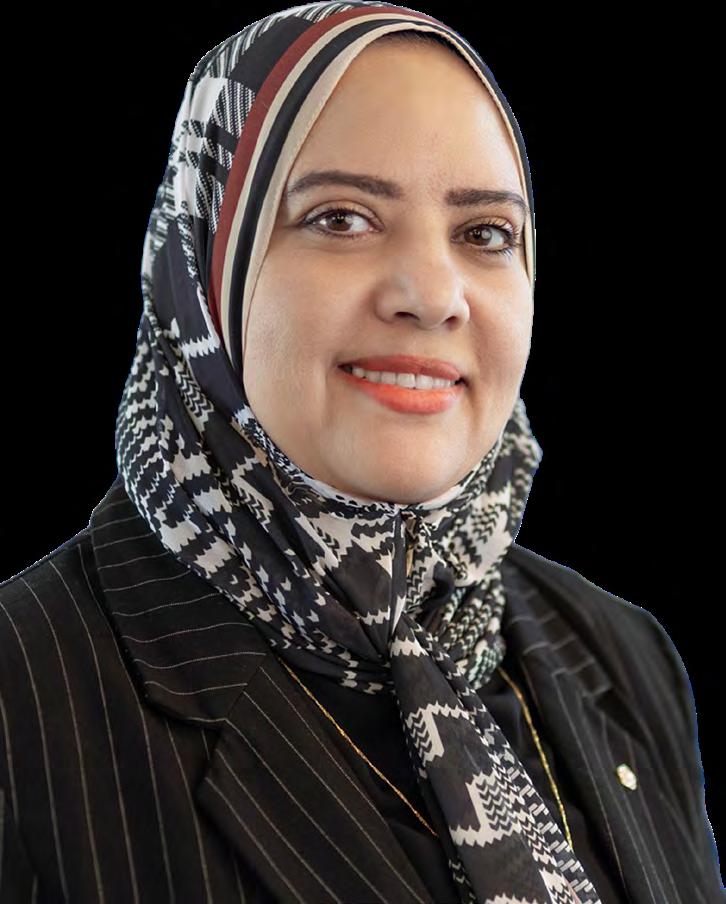
Dr. Shereen Nassar, Global Director of Logistics Studies and Director of MSc Logistics and Supply Chain Management Suite at HeriotWatt University Dubai
Essentials of supply chain management for a resilient
Over the past 20 years, the United Arab Emirates (UAE) has developed into a major global trading and logistics centre, enabling the country to reconnect its economy to the worldwide exchange of products and services. In 2024, the trade sector alone was estimated to be worth $54.5
billion, and if all predictions hold, this sector is expected to be worth approximately $95.2 billion by 2033, representing an average annual growth rate of 5.7 per cent. This is especially true for Dubai, which serves as a central hub for the UAE and boasts the largest port in the region, ranking as the 9th largest container port in the world. By 2026, it is projected that the value of shipments processed through this port will reach $31.41 billion. This demonstrates that the UAE is a key component of the global supply chain, not just a regional stopover.
This illustrates the importance of having a comprehensive supply chain plan.
A successful supply chain strategy aligns the business goals with the company’s capabilities. For firms in the UAE, this involves defining strategies that consider intra-regional trade routes, free zones, and global connections. A hybrid approach should be adopted that balances cost-effectiveness with flexibility, allowing firms to adjust to disruptions without compromising service levels. Strategic alignment mitigates the perception that a supply chain is merely a supporting function, ensuring it adds value to the entire organisation.
The UAE is a major global logistics hub; both Jebel Ali Port in Dubai and Khalifa Port in Abu Dhabi are among the busiest ports in the world. Effective logistics management requires seamless integration of air, sea, and road transport. As key logistics performance measures, timeliness, cost efficiency and responsiveness made digital tracking systems and multimodal transport systems vital for streamlining visibility, allowing for proactive management of delays. Utilising advanced route optimisation software to analyse traffic patterns, delivery windows, and vehicle capacities helps minimise transportation costs, reduce delivery times, and improve overall efficiency.
Whether it is the excess inventory issue or the shortage stock problem, the situation consistently presents a conundrum. For a business, the cost of holding inventory is far too expensive, and when it comes to stockouts, missed sales, and a tarnished reputation, it is all they get. Fast deliveries have become the norm as customer expectations have shifted. Understanding the type of demand is crucial for implementing the proper demand planning and inventory management strategy. In demanddriven inventory systems, tools for automated inventory replenishment are the answer.
Additionally, using advanced analytics and historical sales data, along with real-time data, enables the accurate prediction of customer demand.
Suppliers are not merely transactional partners; they play an integral role in ensuring business continuity. Strong collaborative relationships enhance reliability, quality, and even innovation within the supply chain. In the UAE, where companies have a significant global supplier base, cultural sensitivity and trust are vital and fundamental components for sustaining relationships. Establishing tight connections with the right suppliers is mutually beneficial as it reinforces relationship longevity, growth and stability. Well-balanced, structured performance records greatly facilitate the monitoring and tracking of the relationship value chain. Communication remains fundamental and is still a prerequisite for proactive problemsolving, responsiveness, and collaborative innovation.
Strategic procurement is not merely costsaving; it involves purchasing good-quality, reliable, and sustainable sources of supply. For UAE-based organisations, whose supply chains often span multiple regions, sourcing highquality, reliable, and sustainable supplies is crucial. Geographical diversification of suppliers reduces risks associated with geopolitical tensions, trade barriers, or sudden disruptions. Apart from cost, supplier evaluation models must also measure dimensions such as sustainability practices, innovation potential, regulatory adherence, and ethics. A total value strategy guarantees procurement decisions not only maximise efficiency but also justify longterm value and organisational image.
Digitalisation has transformed supply chain management. Blockchain technology enhances transparency, artificial intelligence facilitates better decision-making, and Internet of Things
devices provide real-time visibility into operations. Following the UAE’s national strategy for digital innovation, firms are embracing these technologies in phases, ensuring that employees are better equipped to benefit from them. The UAE’s national strategy for digital innovation places it at the
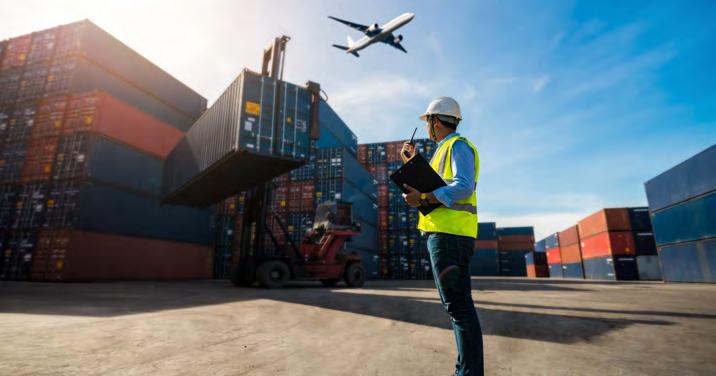
forefront of such transformations. For instance, the UAE is not only embracing technologies like artificial intelligence (AI) but actively leading the application of AI in supply chain management. Traditional, static logistics models are rapidly being replaced by intelligent, automated systems that optimise every stage of the supply chain.
Supply chains are susceptible to pandemics, cyberattacks, natural disasters, and geopolitical tensions. Pre-identification, assessment, and control of vulnerabilities are integral to risk management and essential for building resilience. Companies must prepare backup plans and maintain a diversified network of suppliers as a buffer against unexpected interruptions. Investing in digital technology and advanced data analytics is core to visibility, enabling proactive decision-making and more agile responses to changing and disruptive conditions.
Global supply chains are being increasingly
targeted to meet environmental and social issues. In the UAE, government initiatives such as the Net Zero 2050 strategy further underscore the imperative for sustainable practices. Ethical supply, carbon footprinting, and circular economies are now requirements, not options. Companies must incorporate sustainability metrics into their procurement and logistics decision-making processes to ensure responsible operations. Small and medium-sized enterprises (SMEs) represent a substantial portion of the supply chain and often face difficulties in securing the necessary funding to invest in sustainable practices and technologies. The UAE government offers financial support, including grants and lowinterest loans, to encourage SMEs to adopt sustainable practices. For example, programmes like the Khalifa Fund for Enterprise Development provide funding specifically aimed at promoting innovation and sustainability.
What you can’t measure, you can’t improve. Measuring supply chain performance ensures accountability and continuous improvement. Important performance indicators (KPIs) such as order accuracy, delivery lead time, and costto-serve allow managers to track efficiency and responsiveness. Organisations must use appropriate models to measure their supply chain performance, including a balanced scorecard approach with financial, operational, and sustainability metrics.
Supply chain management is no longer a backroom operation; it’s a driver of competitiveness and business resilience. For UAE-based organisations, having the building blocks in-house from strategy and logistics through to technology and sustainability can unlock potential in an increasingly dynamic world economy. Embracing innovation, encouraging partnership, and demonstrating ethical responsibility can mean not just surviving disruption but thriving through it.
BEGA pole-top luminaires with BugSaver® technology protect nocturnal fauna by reducing the color temperature from 3000 Kelvin to an amber color around 1800 Kelvin, which reduces the light attractive effect. The color temperature and output can be controlled dynamically. bega.com/bugsaver

Das gute Licht.
The Gulf has long been at the crossroads of global trade, linking the spice routes of Asia, the markets of Africa, and the merchant ports of Europe for centuries. Dubai’s position as a renowned global logistics hub and Saudi Arabia’s ongoing emergence as a manufacturing hotspot depict how the region has built its success on connecting markets, goods, and people.
Today, however, the unprecedented challenges that supply chains face in light of ongoing disruptions, shifting trade flows, climate pressures, and ever-evolving consumer expectations raise an important question. It is no longer a matter of whether or when Gulf supply chains must transform, but rather how quickly and effectively they can adopt technology to stay ahead.
five leaders expect to spend $1–5 million, and one in four will spend $6–10 million on supply chain technology, with most expecting to see a return on those investments in under a year.
The once-popular phrase ‘data is the new oil’ has become outdated. Today, the strategic value lies not in data itself, but in the actionable insights and transformative intelligence that AI and agentic AI can extract from it, driving innovation and competitive advantage
Yahyah Pandor, VP and GM, MENAT – Blue Yonder, dives deep into supply chain AI data and illustrates what lies ahead for the Gulf
Over 670 senior leaders across manufacturing, retail, and logistics were surveyed for the 2025 Supply Chain Compass. The results show the scale of the challenge facing our industry, with 82% of leaders saying outdated technology is holding back their supply chain.
Moreover, 87% plan to increase investment in new technologies through 2030. Almost two in
Enter Artificial Intelligence Artificial Intelligence (AI), something our world has increasingly adopted over recent years, is a technological advancement not only capable of increasing productivity but also of planning, predicting risks, and making complex decisions accordingly.
Reinforcing this notion is the manner in which AI is completely transforming supply chains, with 47% of companies using predictive AI and machine learning today, and 40% saying AI has already changed the way they operate. The former improves planning and inventory management, while the latter is being piloted to support more complex decision-making.
The potential benefits of AI for Gulf businesses
are far more significant for better planning and predictability: 37% of leaders identified this as the top advantage, 36% cited faster decisionmaking, 31% better risk management, and 27% increased productivity.
AI is the engine that drives us along a road filled with opportunities to innovate and excel.
Leaders are clear-eyed about the obstacles ahead: 45% cite data security and privacy concerns as the top barrier to AI adoption, followed by data quality (40%), implementation costs (32%), and a shortage of skills (24%).
VP and GM, MENAT – Blue Yonder
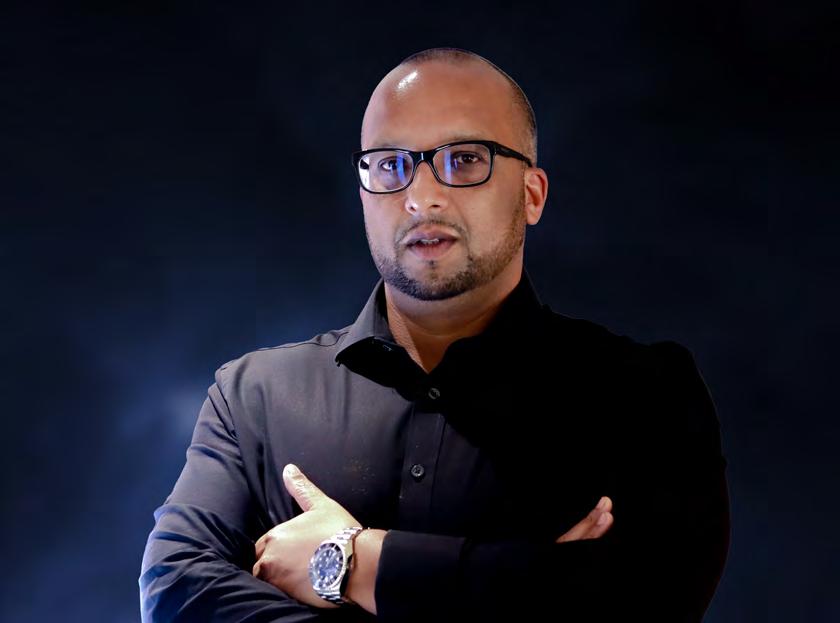
These challenges are global, but the Gulf’s advantage lies in strong government initiatives such as Saudi Arabia’s Vision 2030 (linking digital transformation to economic diversification), advanced infrastructure via AIdriven freezones and ports (which are seeing significant investments in Abu Dhabi and Dubai), alongside ambitious national AI strategies across the board.
Such efforts are creating the right environment, but success depends on private sector readiness. Businesses must
match government momentum by investing in people, supply chain planning, forecasting, and execution to deliver on governmental ambitions.
For supply chain leaders, starting now (strategically) is of the utmost importance. Focusing first on use cases with quick, measurable impact (like warehouse robotics, real-time route optimisation, and predictive demand forecasting), while reskilling teams to build internal capabilities, and partnering with technology providers who can deliver ROI in the first 12 months of collaboration, can provide true value with speed.
With supply chains undeniably supporting the Gulf’s diversification goals – by driving growth across e-commerce, healthcare, renewable energy, and retail – companies that act today will be more resilient, more profitable, and more competitive. Those who hesitate risk being left behind in a region that is continually proving that agility defines success.
The Gulf’s ambition, infrastructure, and visionary leadership are evident; and AI as the catalyst can help set the global benchmark for supply chain excellence. The future is already here — it’s being built in warehouses, ports, and boardrooms across the region.
Angela Pernsteiner, Managing Director of Würth Professional Solutions

Angela Pernsteiner, Managing Director reveals how Würth Professional Solutions is combining deep technical expertise with strategic partnerships to streamline supply chains and enhance project outcomes

To begin, can you introduce Würth and give us an overview of the company’s areas of expertise.
At Würth Professional Solutions, we’re adopting a distinctive,
by Reeba Asghar
forward-thinking approach within the Würth Group. What truly sets us apart is the establishment of a central engineering hub that taps into the collective expertise of all companies
across the group. In many ways, we act as an “industrial Amazon” for the construction and industrial sectors, offering a comprehensive, end-to-end service model.
Our portfolio spans everything from anchors, bolts, nuts, washers, and silicones to PPE and specialised engineering services. But we go beyond just supplying products. Our smart vending solutions ensure that essential items are delivered on-site, on time, and exactly where they’re needed, helping streamline supply chains, boost efficiency, and support our customers at every stage of their project.
In your view, what are some of the key trends and challenges currently shaping the industry landscape today?
In the UAE, sustainability and liveability are increasingly shaping industry priorities. There’s a noticeable shift towards refurbishment over new construction, driven by the need to reduce CO₂ emissions and minimise environmental impact. For instance, our Würth Relast system enables the renovation of bridges and buildings without interrupting their use, offering a practical and sustainable alternative to complete rebuilds. Another exciting trend is the rise of vertical farming. As one of the leading producers of highefficiency LED lighting, we’re now entering into a major partnership to support a GigaFarm project in the UAE, a move that aligns with national goals around food security, energy efficiency, and sustainable innovation.
In what ways is the company leveraging digital technology and automation to improve efficiency and streamline operations?
We’re introducing cutting-edge solutions originally developed for the automotive industry, focusing on automation and optimising supply chain efficiency. Our RFID-enabled Kanban systems and smart vending machines give workers 24/7 access
to materials with just a simple card, eliminating queues and manual distribution processes. Beyond convenience, these systems offer real-time consumption data, enabling decision-makers to monitor exactly how and when materials, such as gloves, are used on site. This level of transparency supports better budget control, boosts efficiency, and enhances project planning. It’s a seamless, onetouch solution that transforms the supply chain experience.
How do you engage with architects, planners, and other stakeholders to support collaborative, long-term project outcomes?
At Würth Professional Solutions, building strong relationships with consultants, planners, and key decision-makers is central to our approach. We engage early with highly technical and demanding consultants to ensure our products meet their exacting standards and secure the necessary certifications.
Though this process is time-intensive, it is vital and forms the foundation of our engineering hub in the region. Equally, we focus on establishing trust with C-level stakeholders, recognising that final decisions are driven by confidence and reliability, qualities we are committed to delivering consistently.
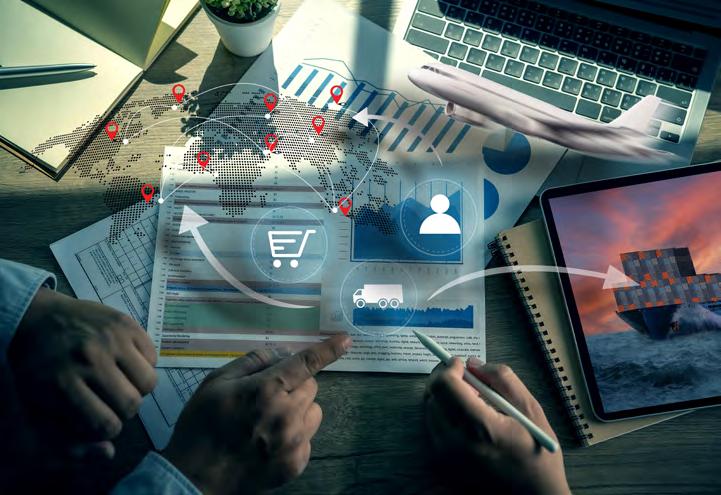
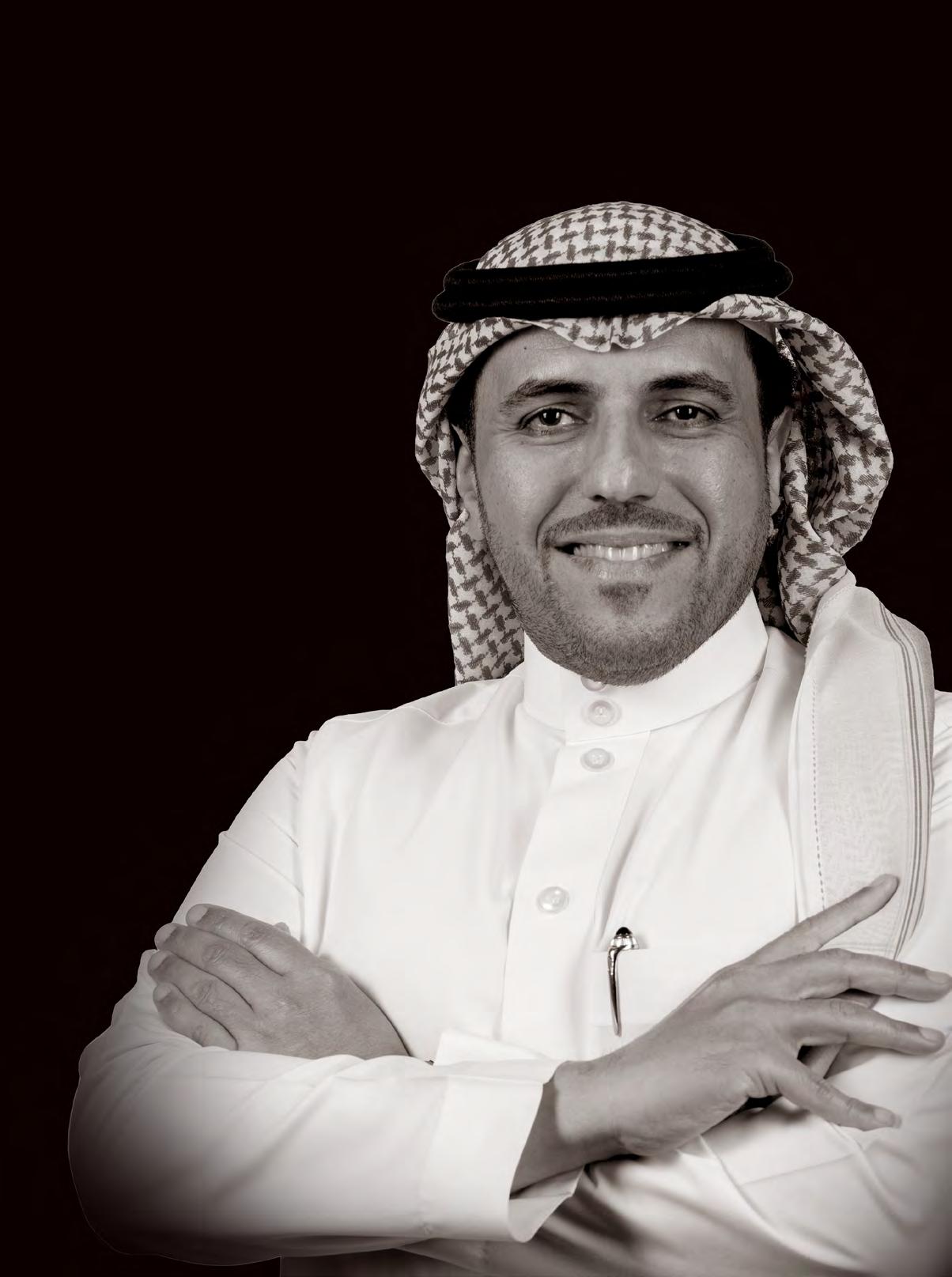
He moves 18 countries, and a billion expectations.
Abdulaziz Busbate, CEO, DHL Express MENA, on leadership that outpaces the landscape

The Middle East and North Africa are not just a region; they’re a living, breathing challenge. Dynamic, layered, full of contradictions and untapped possibilities. Leading DHL Express across 18 countries and over 5,800 people, Abdulaziz Busbate embodies a rare mix of bold vision and grounded humanity. In this candid conversation, he reveals what it truly means to lead in times of seismic change: to embrace complexity as opportunity, to put people at the heart of technology, and to empower a generation ready to take the reins. This is not a story of logistics as usual, it’s a story of transformation, resilience, and purpose.
You’ve stepped into the CEO role just as logistics is being redefined. What’s the biggest shift you believe the industry and the region is about to see?
We are seeing three major shifts. First, technological advancements like AI and automation are streamlining warehousing, routing, and customer experience in ways we couldn’t imagine a few years ago.
Second, sustainability is becoming non-negotiable. Clients now expect green solutions from their suppliers, and governments are introducing regulations to enforce carbon efficiency and waste reduction.
We are also seeing a shift in the region’s economic portfolio, with countries like Morocco and the UAE emerging as stronger logistics and trade hubs as they diversify their economies.
Leading such a diverse region must come with its own challenges. How do you manage 18 countries and over 5,800 people under one brand? You lead it by staying close to your people. Leadership at scale is all about trust, alignment, and empowering teams to act with purpose. We may span 18 countries, but our teams are deeply rooted in their local markets. That local intelligence is our strength.
My job is to set the tone with clear direction, strong values, and a shared belief in why we do what


we do. That’s how you maintain consistency without being rigid. DHL has an incredible culture of performance and pride, and I work closely with my team to protect and amplify this culture.
Looking back at your career, from managing Bahrain to leading Saudi Arabia and now the entire MENA region, what were the key moments or decisions that prepared you for this role?

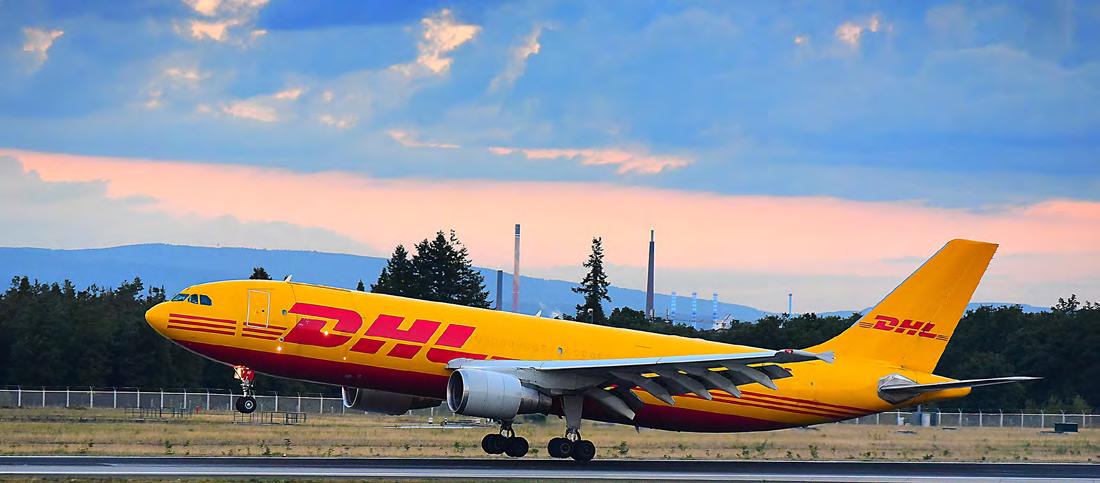
Taking on the role of Country Manager in Bahrain in 2015 was a turning point. It gave me exposure beyond a single market as I gained a deeper understanding of our regional network, our infrastructure, and how the business operates across borders. I later applied that perspective in Saudi Arabia, where we restructured our office in Riyadh and expanded our footprint to better serve both local and international demand. That decision was a key step in preparing for broader regional responsibilities.
DHL’s history is one of dominance, but staying disruptive requires agility. How do you ensure DHL remains ahead in a fastchanging industry?
We stay disruptive by staying close to our customers. In logistics, demand patterns are constantly changing, and if you are not vigilant, you will already be behind. Our role is to understand those changes as they happen and act accordingly.
A notable example is what we experienced during the COVID pandemic. We saw a sharp shift from B2B to B2C as consumer behaviour changed. This required us to quickly expand our last-mile capacity, reconfigure delivery routes, and adjust our staffing models to meet the rising demand for residential services. Now, with B2B growing again, we are recalibrating by investing in speed and reliability for business shipments.
We make it a point to continuously assess our network setup, realign it with customer expectations, and adjust it based on what the market requires.
When people talk about MENA, they often talk about complexity. What do you see instead? untapped potential, or underestimated markets?
MENA is undoubtedly complex geopolitically, economically, and operationally. However, we view complexity as a source of opportunity.
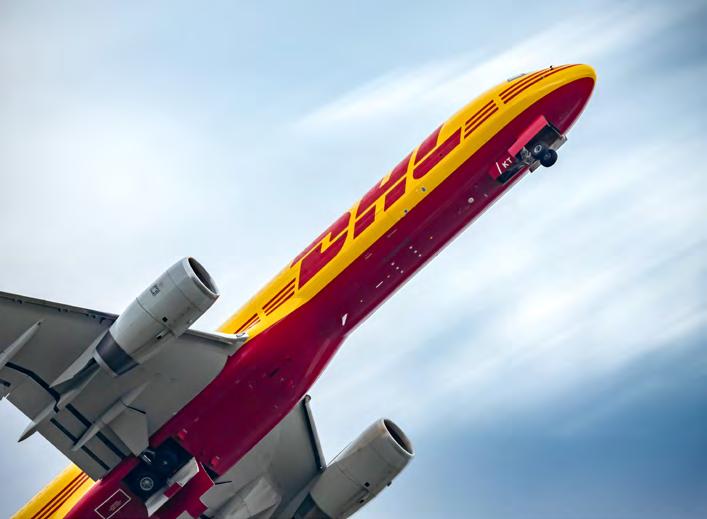
This is a region where adaptability is a requirement, and that is where our teams excel.
More importantly, many markets across MENA remain underestimated. We are witnessing growth in intra-regional trade, renewed investment flows, and an increasing demand for faster and more reliable logistics. These are signals of untapped potential. With the right setup and strong local teams, we are wellpositioned not just to manage complexity but to grow through it.
You’ve touched on sustainability as a major shift, but beyond strategy decks, what does meaningful, measurable progress actually look like across your operations?
Sustainability is one of our core global pillars, and we are aligning our operations and infrastructure in the region to reflect that.
We have already made progress on several fronts. We are using Sustainable Aviation Fuel (SAF) as part of our air operations. A portion
of our forklifts has shifted to electric models. We have also installed solar panels across key facilities to reduce our energy consumption.
Embedding sustainability is an ongoing process, and I won’t say we are done. But the important thing is that the mindset is shifting. The region as a whole is moving in the right direction, and we are committed to being part of that change.
At the same time, automation and AI are transforming logistics at high speed. How do you ensure innovation supports your workforce rather than sidelining it?
We see technology as an enabler, not a substitute for our people. While we keep pace with the latest advancements in AI, automation and digitalisation, we approach every innovation with the emphasis that it should enhance our workforce, not displace it.
Where we are integrating technology is in areas that benefit from greater efficiency, such as automating manual or repetitive processes in our operations. In doing so, we are freeing up our teams to focus on higher-impact tasks, while creating a more efficient and scalable network.
With so much change happening across geopolitics, trade routes, and customer demands, what’s the pressure point that keeps you up at night? And what’s the spark that keeps you moving forward? What motivates me is our people. I am proud to work with such a strong and capable team across the region. I trust them fully, especially those on the ground, who carry the
responsibility of keeping our operations running day in and day out.
What keeps me up at night are security-related concerns, especially cyber threats and situations that might put our people at risk. In a region like ours, things can shift quickly. My first priority is always their safety, ensuring that whatever happens, our people remain safe and sound – both at work and at home. That is a responsibility I take very seriously.
If we put DHL Express MENA five years into the future, what headline do you hope we’re writing about the business under your leadership?
I would like the headline to read: “DHL Express MENA Achieves Full Regional Coverage, Powered by Next Generation of Local Talent.”
That is the direction we have committed ourselves to. Our focus remains on expanding our reach across every corner of the region, with no gaps or underserved markets. But growth alone is not the goal. What matters more importantly is who drives that growth.
I believe the progress of this sector lies in empowering the next generation. We need to bring in fresh talent
that thinks differently, challenges the norm, and brings new energy into the organisation. At the end of the day, this is their region, and their company. Our role is to create the space for them to lead, and the responsibility to deliver should sit with those who know their markets.
Abdulaziz Busbate’s leadership is defined by something rare in today’s world: genuine care for the people behind the business. Leading thousands of team members, he understands that progress isn’t built on systems alone but on trust and connection in those who do the work every day.
In a fast-moving place like MENA, he knows that real strength comes from leaning into uncertainty and giving people the freedom to adapt and grow. For him, leadership means creating space for others to step up and to take ownership, to challenge the status quo, and to drive change with passion and purpose.
At its core, this isn’t just a story of logistics, it’s a story of people. Of how one leader’s belief in his team transforms complexity into opportunity, and how that shared momentum is shaping the future of an entire region.
Abdulaziz Busbate’s Four Guiding Principles
“Over the years, I’ve learned a few things that have stayed with me.
First, always be fair - with yourself, your team, and the company. Fairness is part of our culture at DHL, and when you adopt it naturally, it shapes how you lead.
Second is developing people - listening and effective communication are essential for progress and helping others grow alongside you.
Third, be honest and transparent.
And finally, respect matters. Treat people with respect, and you’ll see it come back to you in trust, performance, and results.”



On 16 September 2025, logistics professionals from across the region gathered at Al Habtoor Palace Dubai for LNME Connect. This wasn’t just another industry forum. It was a chance to get real about where logistics is heading, and what it will take to get there.
Logistics isn’t glamorous. It’s complex, demanding, and often invisible to the outside world. But that’s exactly why conversations like these matter. Because behind every delivery, every system, every smooth operation, there are people making it all work.
This year’s forum focused on what’s changing, and what still needs to. AI is no longer optional. Automation isn’t a buzzword. From data-driven

supply chains to electric fleets, the pace of transformation has accelerated. Companies that don’t adapt quickly risk falling behind.
At the same time, one truth remains. It’s still people who move this industry forward. The tools are evolving, but it’s the planners, operators, and decision-makers who shape what comes next.
Across four panels, speakers tackled the real issues. From future-proofing cold chains and scaling electric fleets, to using AI in practical ways and rethinking warehouse models, every discussion brought sharp insight and honest perspective.
The following pages capture the voices and visions shaping logistics in the years to come, laying the groundwork for an industry that works smarter and moves faster.
Multimedia Production Credits: Eduardo Buenagua, Joel Amparo and Farooq Salik
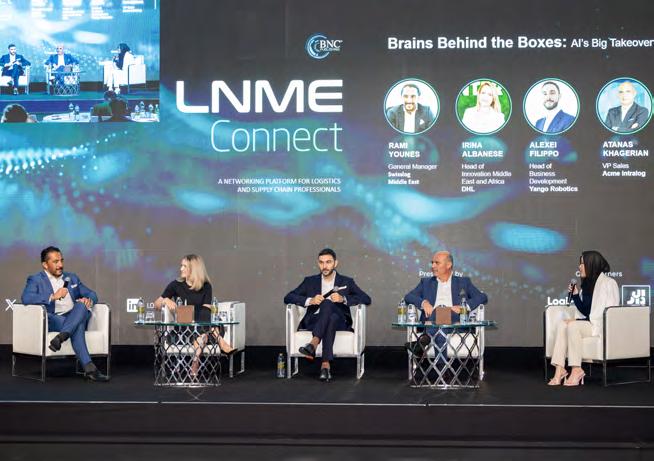
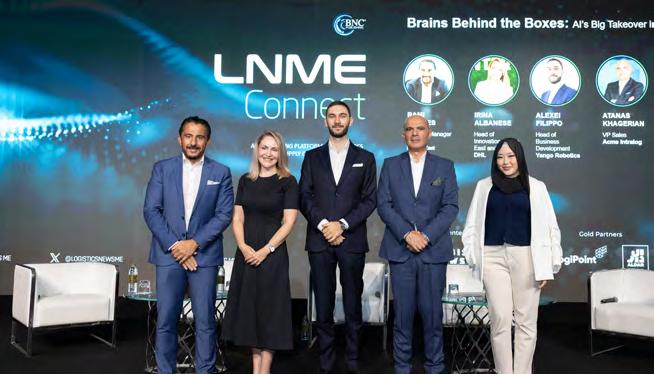

Rami Younes
General Manager
Swisslog Middle East
Irina Albanese
Head of Innovation Middle East and Africa
DHL
Alexei Filippov
Head of Business Development
Yango Robotics
Atanas Khagerian
VP Sales
Acme Intralog
Moderator:
Aya Zhang, Editor, Logistics News ME
Artificial intelligence is rapidly redefining the logistics landscape, offering new possibilities from warehouse automation and predictive analytics to enhanced energy efficiency and robotics. This panel examined how businesses across the Middle East and Africa can adopt AI technologies at scale without hefty upfront costs. Discussions
focused on practical applications, including Swisslog’s robotics-driven warehouse improvements, DHL’s approach to combining operational efficiency with sustainability, and Yango Robotics’ strides in adaptable robotic systems. The session concluded by recognising AI as a key catalyst reshaping the future of logistics in the region.

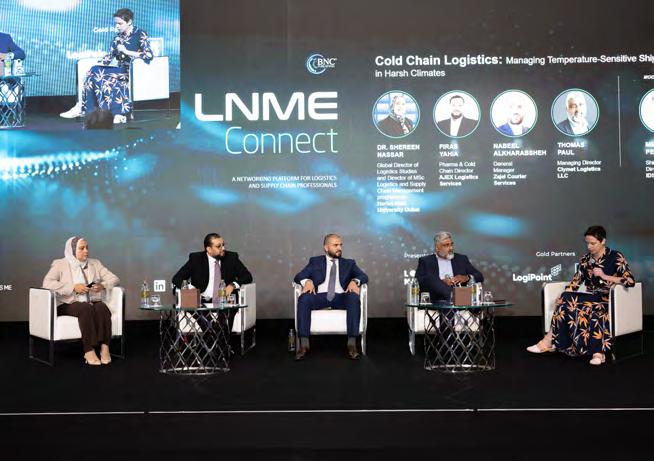
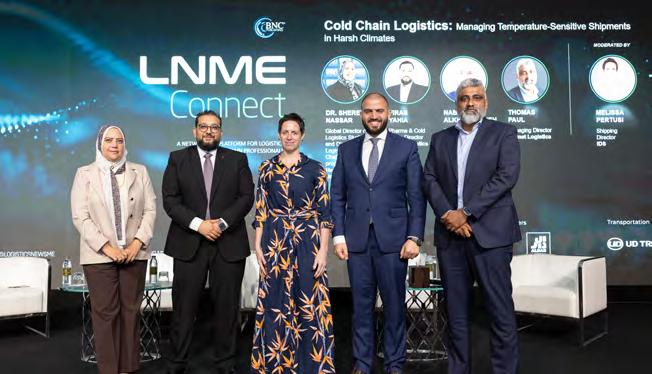
Dr. Shereen
Nassar
Global Director, Logistics
Studies & MSc Programme
Director
Heriot-Watt University
Dubai
Firas Yahia
Pharma & Cold Chain
Director
AJEX Logistics Services
Nabeel
Alkharabsheh
General Manager
Zajel Courier Services
Thomas Paul
Managing Director
Clymet Logistics LLC
Moderator: Melissa Pertusi, Shipping Director, IDS
Ensuring the integrity of temperaturesensitive shipments in the GCC’s extreme climate presents unique challenges. This panel explored innovations in packaging, transport materials, and digital monitoring that help prevent temperature breaches. The discussion also highlighted the importance of stronger collaboration between academia and industry to accelerate cold
chain innovation and build resilient supply systems. Panelists shared insights on balancing stringent regulatory requirements with the need for agility and strategies for managing high volumes during peak periods. Experiences from critical projects, including vaccine distribution, underscored the urgency of future-proofing cold chain operations against climate volatility and supply disruptions.
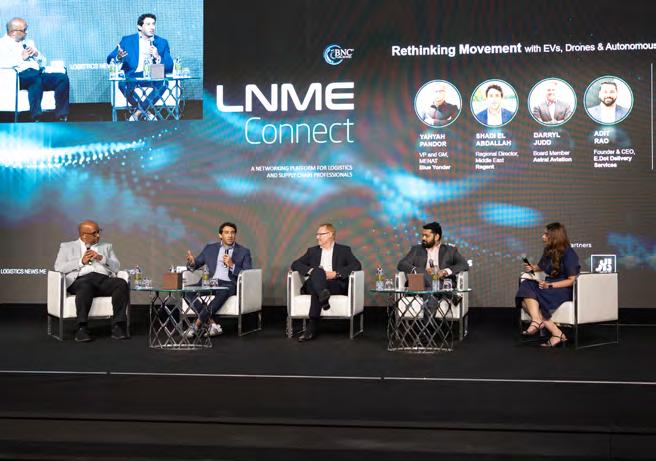
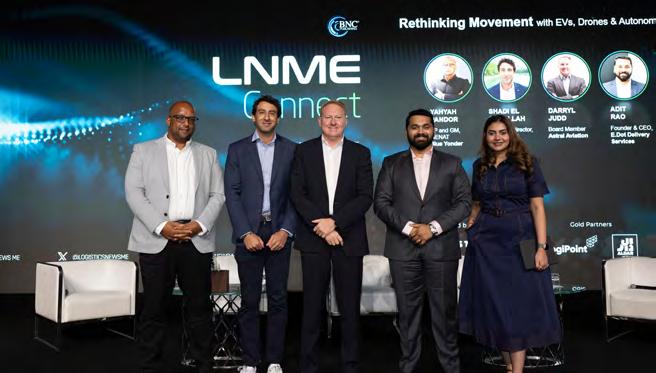
Electric vehicles, drones, and autonomous systems are ushering in a new era for logistics in the GCC. This panel examined the role each technology plays in balancing speed, cost, and emissions, alongside the critical role of AI in integrating these innovations into supply chains. Discussions covered regulatory frameworks,
Yahyah Pandor
VP and GM, MENAT
Blue Yonder
Shadi El Abdallah
Regional Director Middle East REGENT
Darryl Judd
Executive Director, Astral Aviation & Managing Partner
Logistics Executive Group
Adit Rao
Founder & CEO
E.Dot Delivery Services

Moderator:
Vibha Mehta, Editor-in-Chief, Construction Business News ME
the challenges of scaling drone delivery, and the transformation of last-mile fleets towards electric and autonomous models. Panelists emphasised the need for businesses to rethink their end-to-end supply strategies and invest in infrastructure innovation to remain competitive in a rapidly evolving mobility landscape.
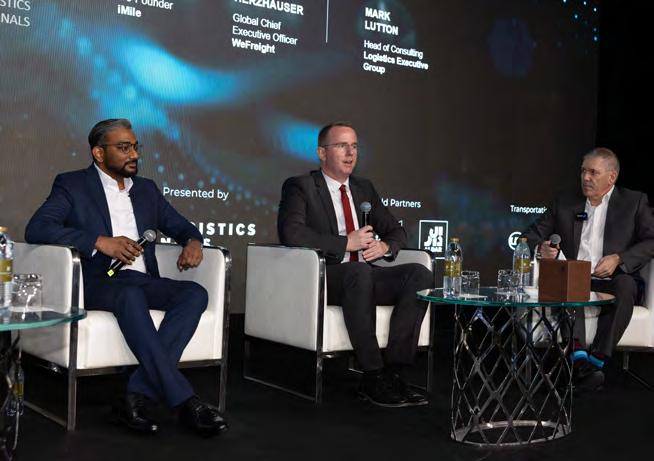
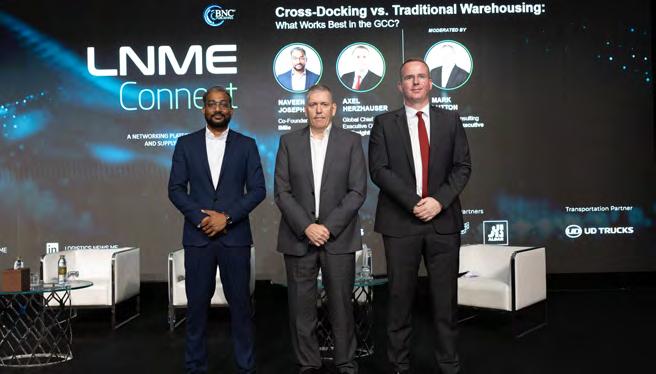
The panel included:
Naveen Joseph
Co-Founder
iMile
Axel Herzhauser
Global Chief Executive Officer
WeFreight Moderator: Mark Lutton, Head of Consulting, Logistics Executive Group

ith last-mile delivery demands rising across the GCC, this panel weighed the advantages of cross-docking against traditional warehousing. Speakers clarified the core differences between the models and debated whether cross-docking is becoming the dominant approach or if traditional warehousing remains
essential. The discussion suggested a hybrid future that combines both strategies to optimise speed, flexibility, and capacity while addressing operational risks. Real-world examples from the region illustrated successes and challenges, underscoring the need for logistics providers to tailor solutions to the unique market dynamics of the GCC.

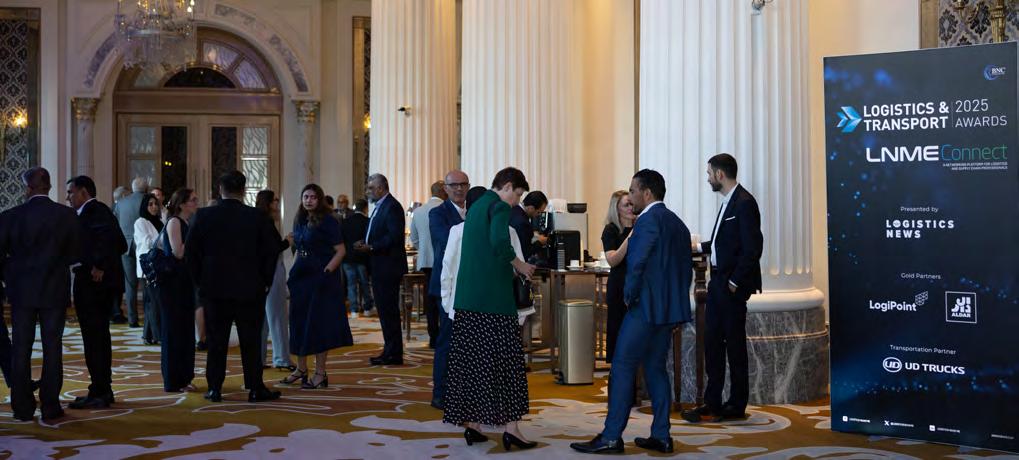

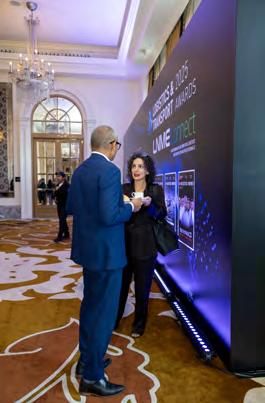
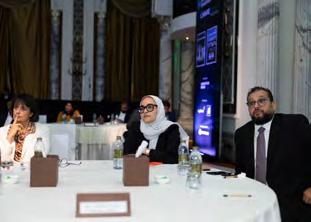
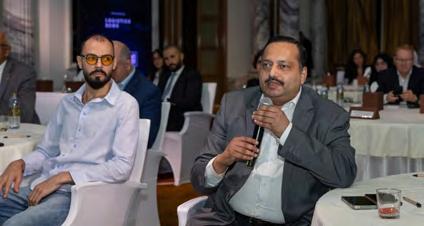
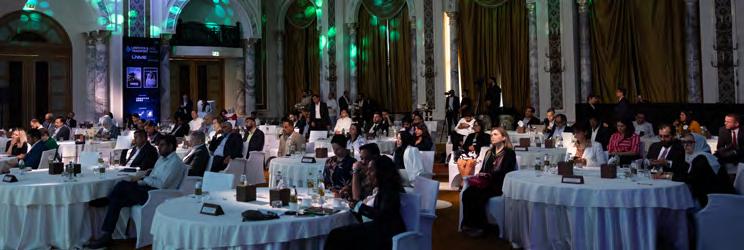
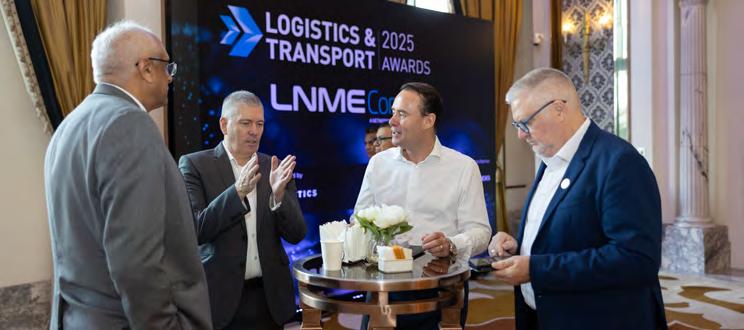

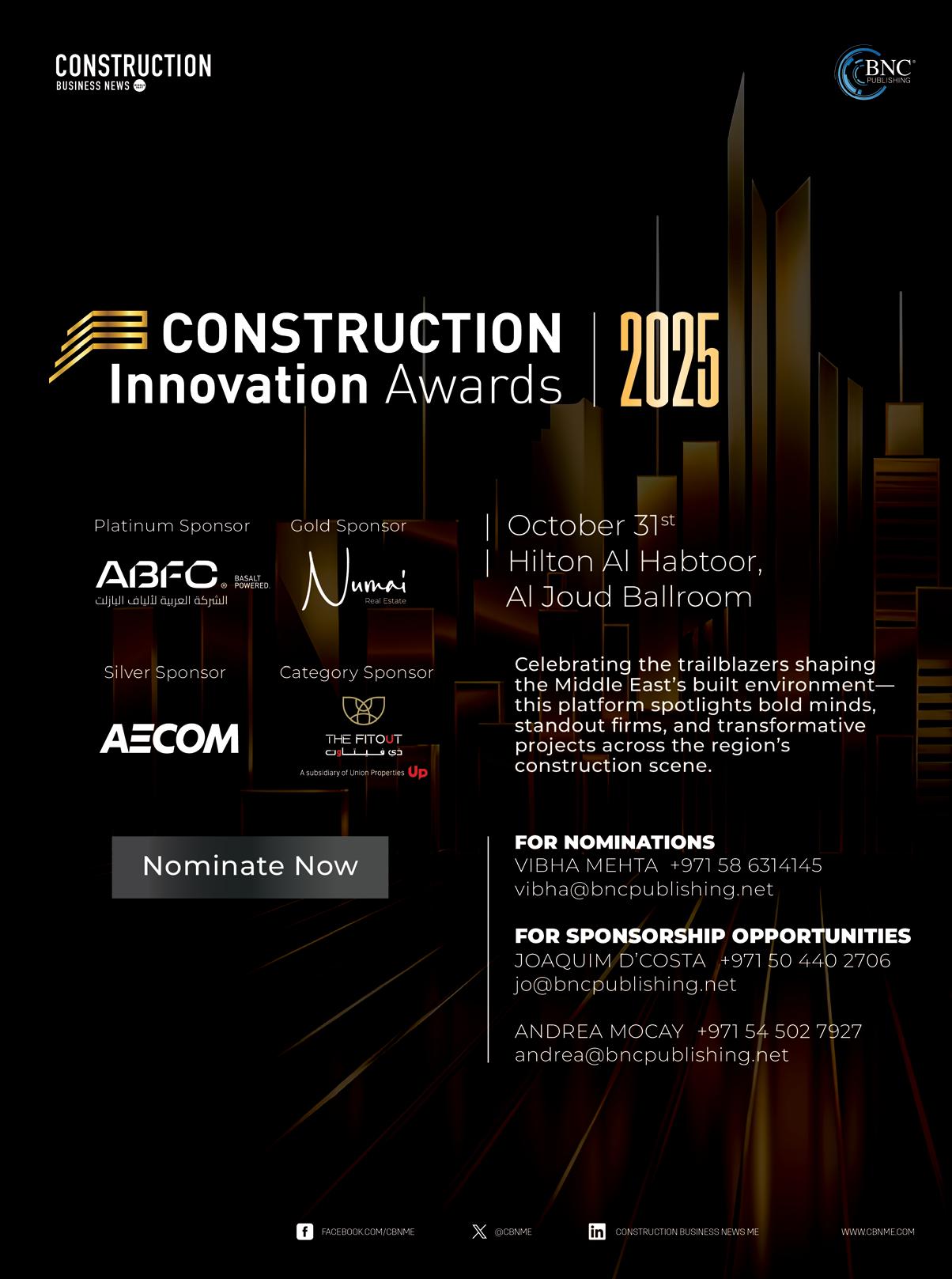





On the evening of September 16th, the majestic Al Habtoor Palace in Dubai became the epicentre of the logistics world as the Logistics & Transport Awards 2025 unfolded in full splendor. More than just a ceremony, it was a showcase of where the industry has come from and where it’s racing toward. Leaders from across supply chains, transport corridors, tech innovators, and regulatory visionaries assembled to celebrate achievements set against a backdrop of rising demand, global disruption, and accelerating change.
This year’s awards saw entries that pushed boundaries, ideas built on resilience, on digitisation, on eco-conscious operations that challenge traditional norms. From pioneering last-mile delivery models and green fleet innovations to
seamless port-rail interchanges and border-automation advancements, the scope of excellence was as broad as the ambitions it represents. As the honours were announced, what resonated most was not just the recognition of accomplishment, but the narrative of a logistics sector transforming itself, embracing efficiency, sustainability, and strategic foresight with every passing kilometre.
Against ballroom lights and a room buzzing with possibility, the Logistics & Transport Awards 2025 did more than hand out trophies, it signalled a collective commitment to fulfilling tomorrow’s promise today. It was a night to acknowledge the triumphs, yes, but also to renew the resolve: to build supply chains that are not just powerful, but adaptable; not just fast, but responsible; not just functional, but visionary.

Multimedia Production Credits: Eduardo Buenagua, Joel Amparo and Farooq Salik


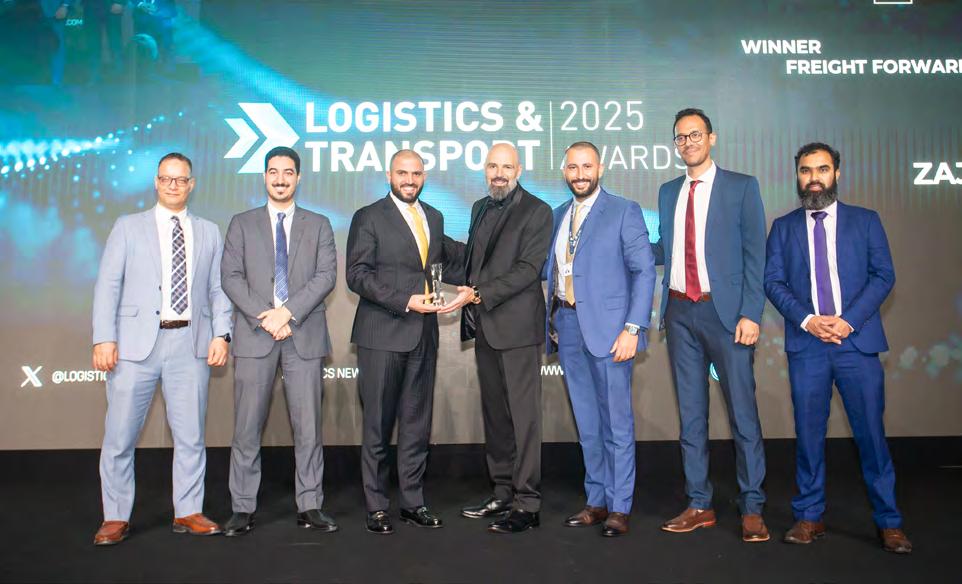
Demonstrating outstanding capability in handling complex and large-scale freight movements, the company has delivered across both domestic and cross-border operations. Highlights include the airlift of 100 tonnes of cargo from India to Iraq, the transport of a 32-metre load within the UAE, the deployment of 100 flatbeds for a single project in Saudi Arabia, and the handling of 58 ISO tank movements from KSA to the UAE — each project executed with precision and scale.


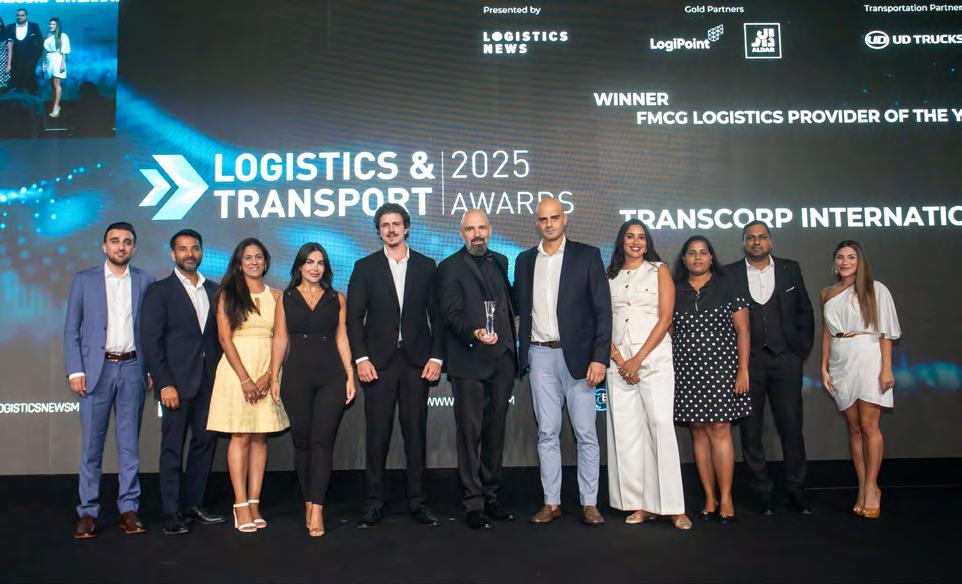
With a fully integrated cold chain ecosystem covering 100% of the UAE, a fleet of over 1,000 refrigerated vehicles, and the ability to handle over 50,000 temperature-controlled deliveries every day, Transcorp has set the gold standard in freshness and reliability. Their innovative Dark Store-as-a-Service model and real-time tech solutions are helping FMCG brands scale faster, smarter, and colder.


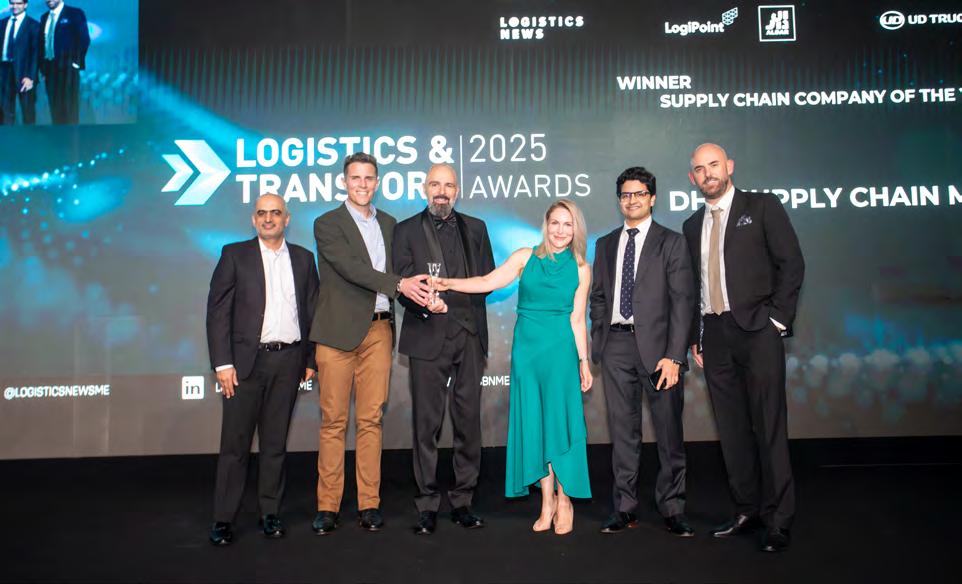
With a bold expansion of its contract logistics portfolio and a pioneering joint venture with Aramco launching the region’s first integrated procurement and logistics hub, DHL is driving unmatched supply chain resilience and sustainability across the Middle East. Their investment in cutting-edge automation, AI, and sustainability initiatives, backed by €500 million committed to the region, delivers scalable, cost-efficient solutions for diverse industries, solidifying their position as the region’s supply chain leader. DHL SUPPLY CHAIN MEA


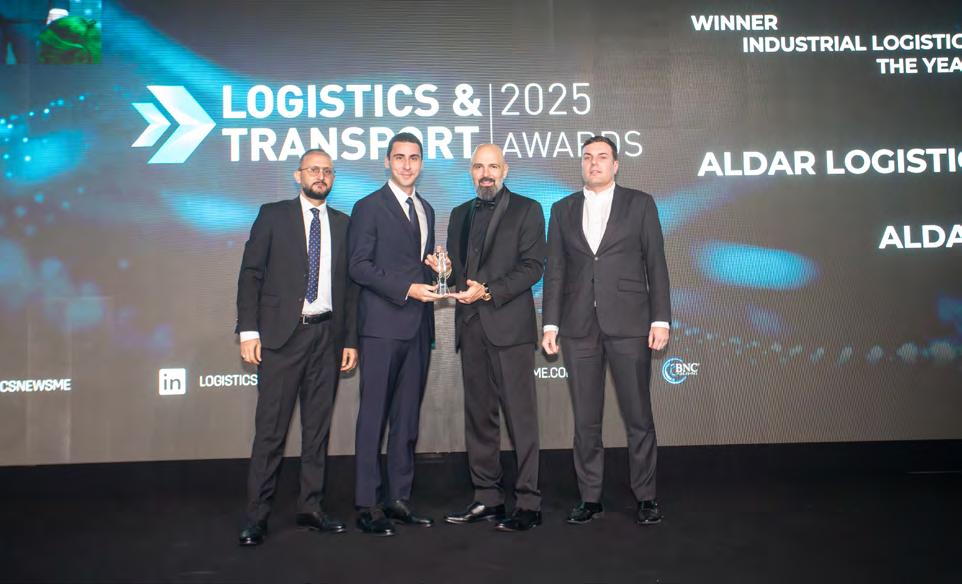
This project stands out for the sheer scale and thoughtful design: three state-of-the-art Grade A buildings in the National Industries Park, offering modular layouts that adapt to tenants of all sizes. It leverages excellent connectivity within Dubai’s logistics corridor, marrying top-tier infrastructure with flexibility and future growth in mind.


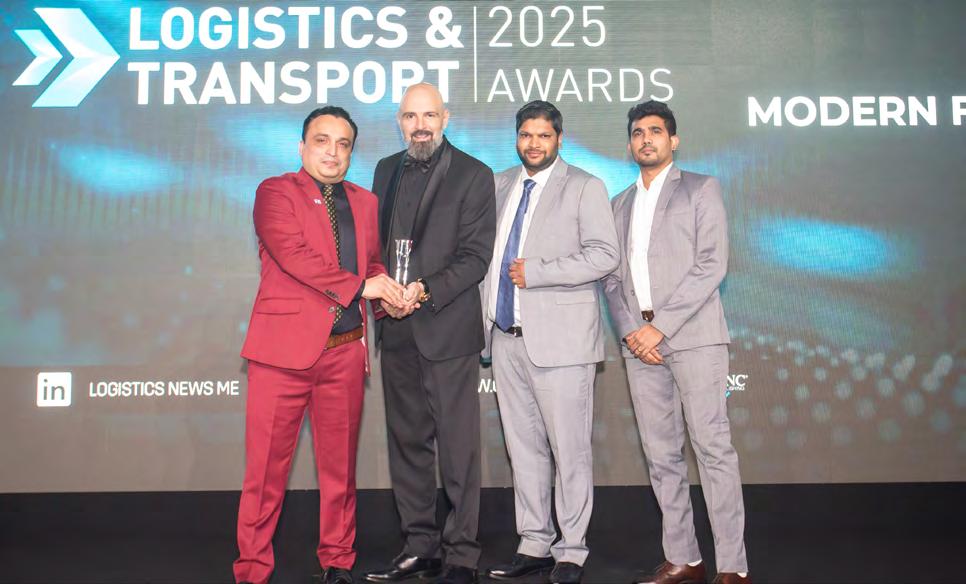
MFC has been setting the standard in heavyweight and breakbulk logistics since 1977. From moving a 360-ton mooring buoy with precise coordination, to transporting two 160-ton tugboats from China under challenging conditions, their track record speaks volumes. The team has also managed oversized mooring chains and vessels with seamless customs clearance and complex logistics execution. Their expertise in navigating regulatory hurdles and delivering on time cements their position as a leader in breakbulk operations.


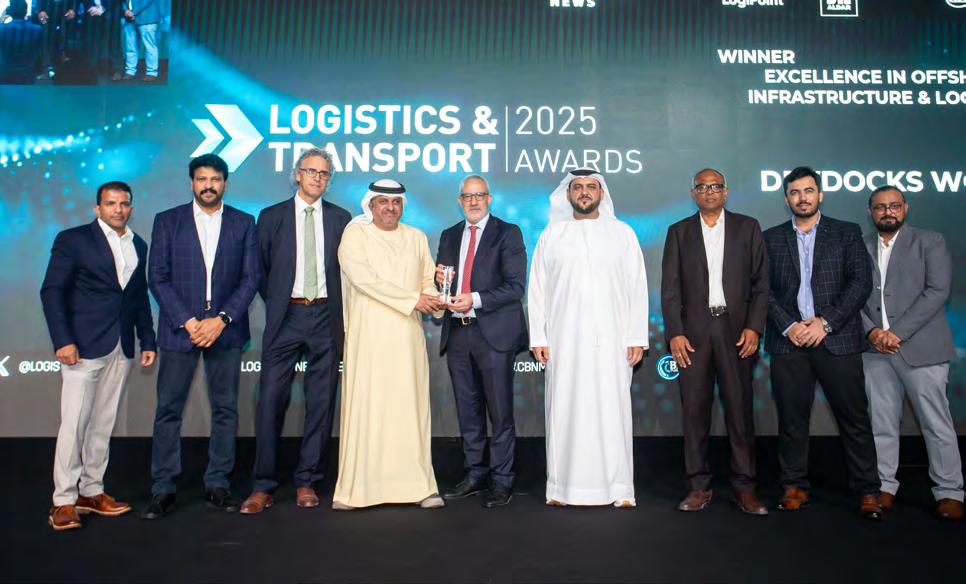
This award recognises a leader in offshore infrastructure, delivering exceptional scale and precision across marine logistics. Operating the largest ship repair facility in the Middle East and managing over 300 marine projects annually, the company continues to raise the bar. Its recent state-of-the-art yard expansion has increased capacity by 40%, reinforcing its position as a benchmark for innovation, reliability, and operational excellence in the offshore sector.


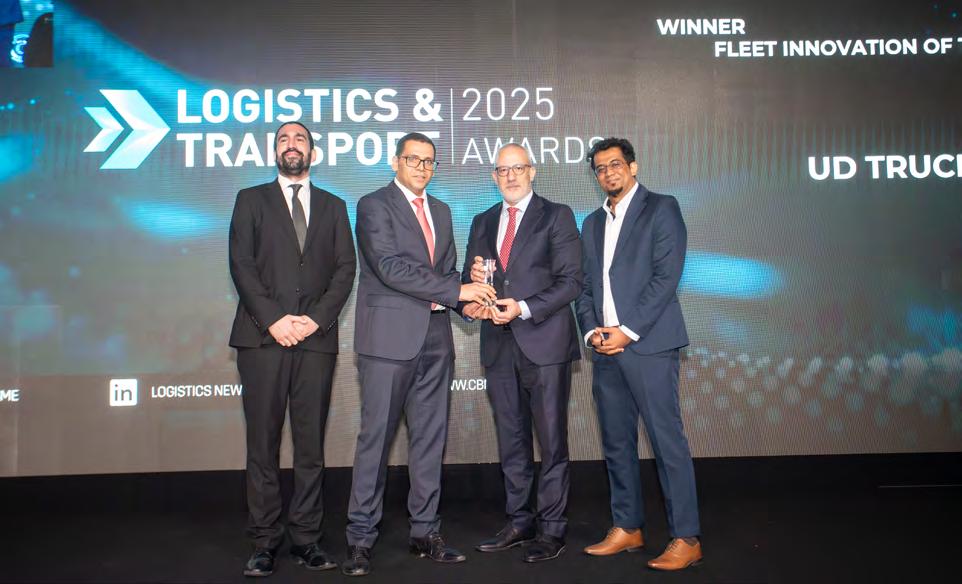
This innovation marks a major step forward in fleet management by seamlessly upgrading telematics to a comprehensive Connected Services platform. Offering real-time insights, predictive analytics, and advanced features, it empowers fleet managers and drivers to optimise performance, improve safety, and streamline operations — setting a new standard for modern trucking.


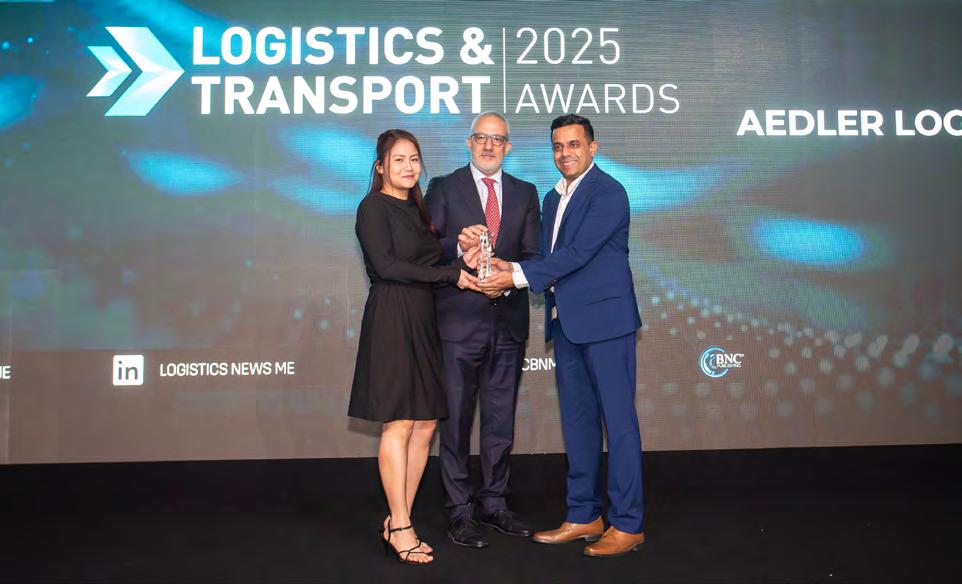
Aedler Logistik Solutions stands out for pioneering cutting-edge technologies like AI, machine learning, and IoT to revolutionise supply chain operations. Their autonomous mobile robots and shuttle systems optimise warehouse throughput and reduce errors without preset routes. Through cloud-based WMS and simulation software, they deliver real-time traceability, scalable operations, and predictive logistics strategies—ensuring efficiency even during demand peaks. Their innovative solutions, demonstrated in a major regional facility, set new standards in supply chain automation and operational excellence.


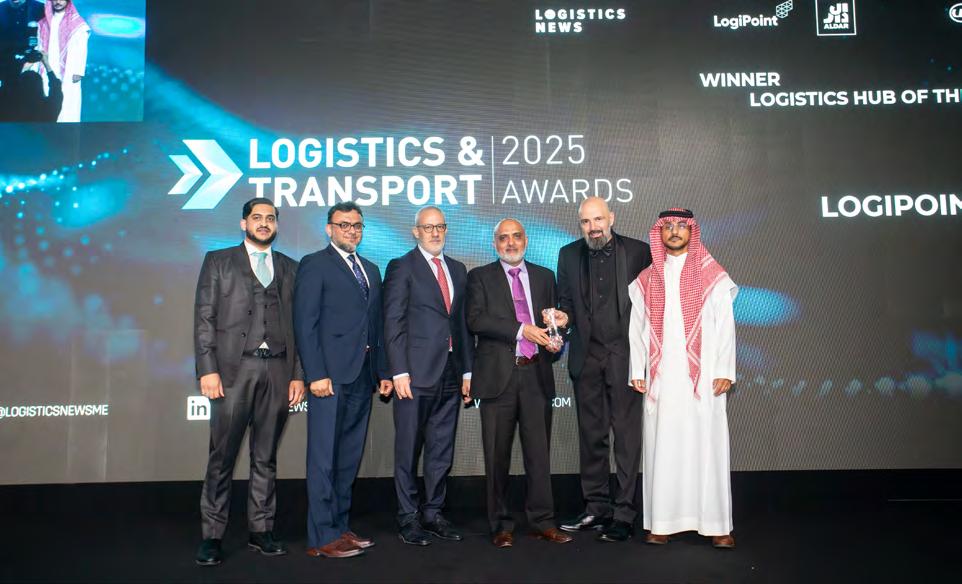
In a period marked by global shipping disruptions, this logistics hub stepped up with real solutions. By operationalising the Saudi land-bridge between Jeddah and Arabian Gulf ports, they offered a faster, scalable alternative to compromised Red Sea routes — easing supply chain pressure and keeping trade moving. Their efforts reflect not just resilience, but a bold alignment with Vision 2030’s ambition to make Saudi Arabia a global logistics powerhouse.
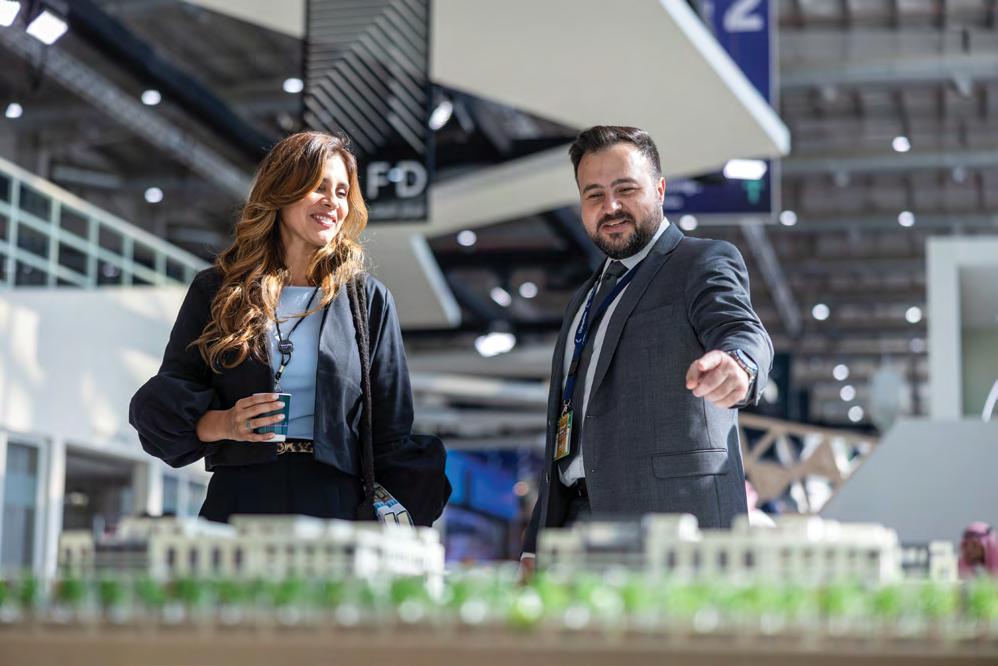
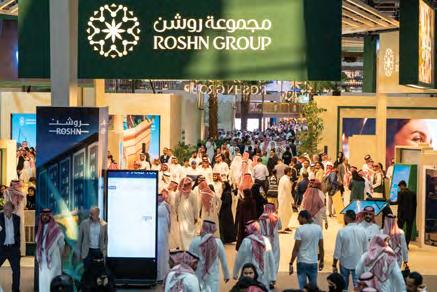
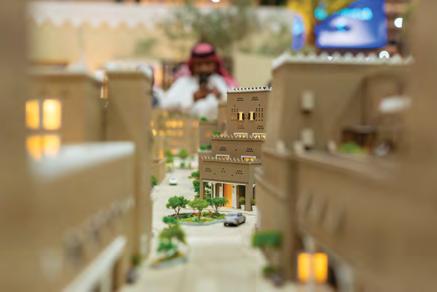





HEAVY-DUTY TRUCK OF THE YEAR
DAIMLER TRUCK MIDDLE EAST & AFRICAMERCEDES-BENZ NEW ACTROS 1845LS PROCAB
This truck sets a new standard in the heavy-duty segment, combining advanced technology with exceptional fuel efficiency and driver comfort. Its aerodynamic cab design reduces drag for improved economy, while a powerful and efficient engine delivers strong performance. Equipped with smart safety systems and an easy-touse digital interface with voice control, this truck ensures safety and convenience for drivers, making it a clear leader in its class.


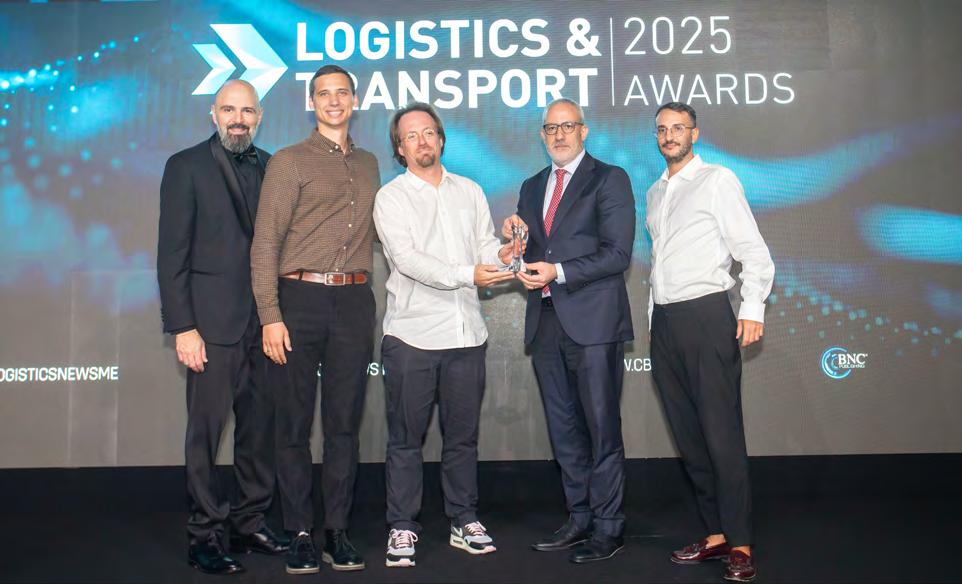
QUIQUP EXPRESS LOGISTICS PROVIDER OF THE YEAR
Delivering speed with precision, Quiqup has redefined express logistics through its techdriven ecosystem and relentless focus on customer experience. With lightning-fast, reliable delivery solutions powering businesses across the UAE, they continue to set the pace for the region’s last-mile logistics industry.


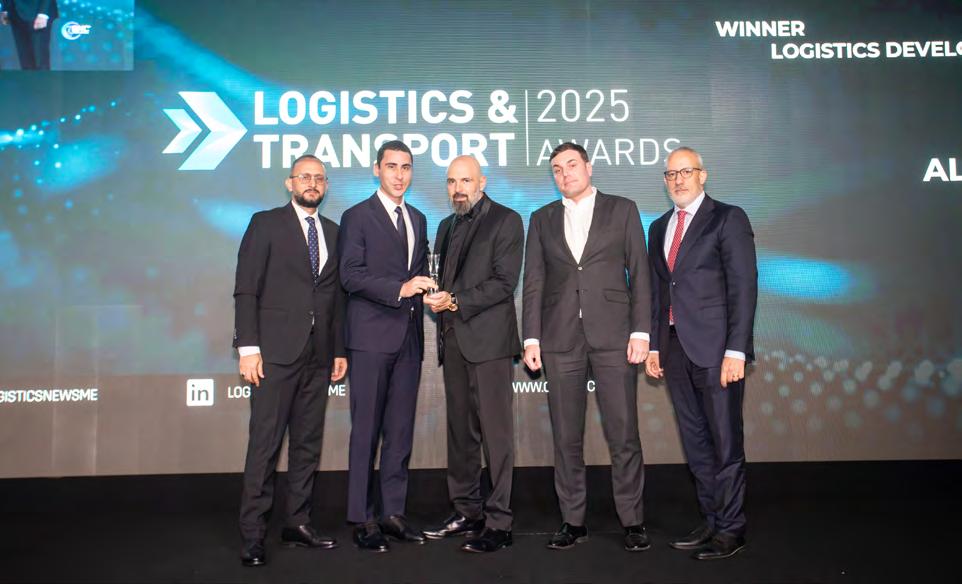
This award recognises a regional real estate leader with a proven track record of delivering innovative industrial and logistics assets across the UAE and beyond. With a robust portfolio exceeding 200,000 square meters of existing logistics space, 400,000 square meters under development, and 400,000 in the pipeline, they offer comprehensive, flexible, and scalable solutions tailored to meet evolving market demands. Supported by strong financial backing and a commitment to sustainability, this company is driving the future of logistics infrastructure in the region.


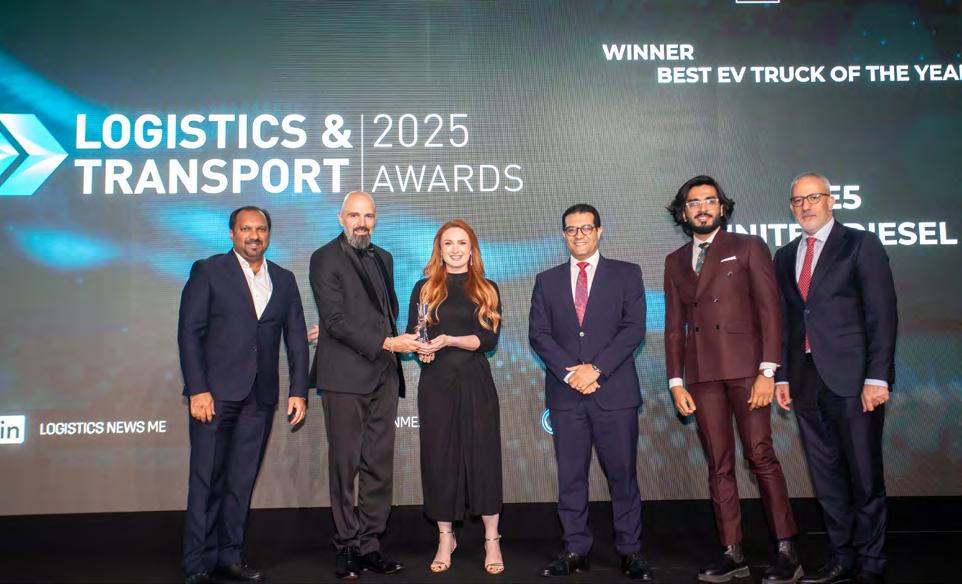
With the best EV platform technology and the longest 8 years or 500,000 km battery warranty, the team has gone beyond bringing world-class electric trucks to the UAE. They are enabling charging solutions, power upgrades, and data-driven fleet optimisation to create a full commercial EV solution. With the TE5 leading the charge, the company delivered unmatched range, payload capacity, and durability, all engineered for the region’s toughest conditions.


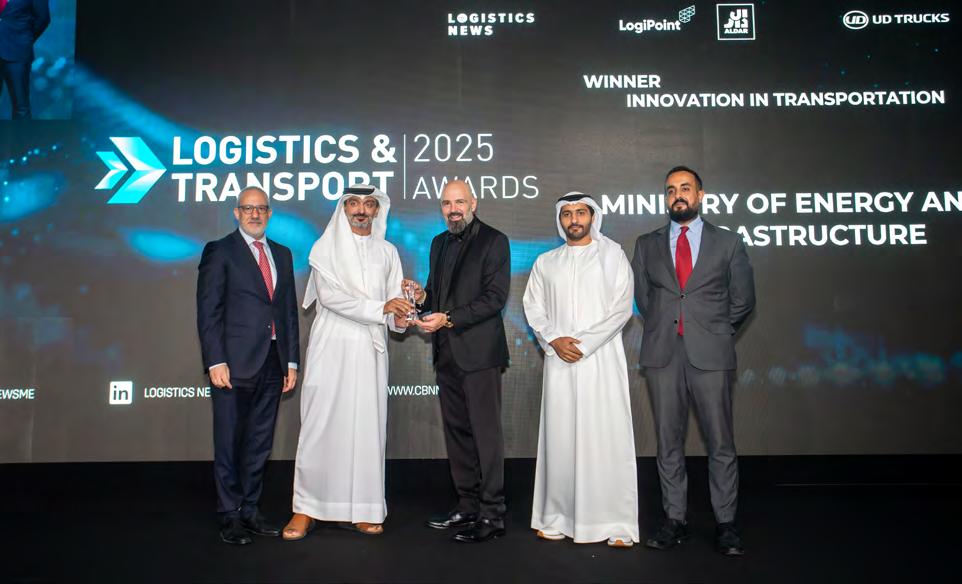
This year’s winner in the Innovation in Transport category has demonstrated remarkable commitment to progress, technology, and national impact.
Their recent contributions to advancing transport systems in the UAE reflect the kind of forward-thinking leadership that this award was designed to recognise.


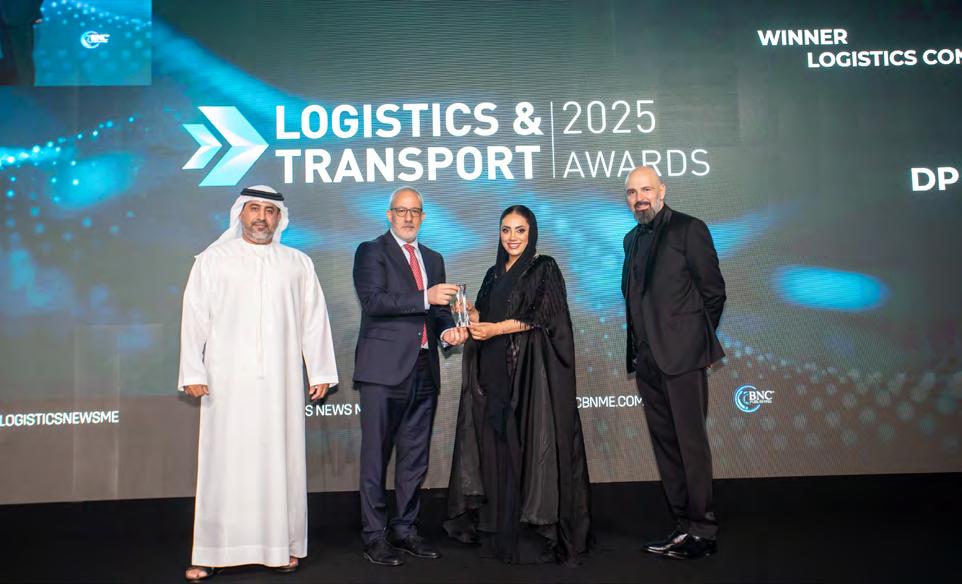
DP World has a vast network of over 220 offices and state-of-the-art infrastructure, delivering fully integrated supply chain solutions across the GCC and beyond. Their multimodal transport services, advanced temperature-controlled storage, and heavy cargo handling set industry standards. Strategic hubs like Jebel Ali and Jeddah, combined with innovative fuel-efficient trucking and tech-driven 4PL control towers, showcase their commitment to efficiency, growth, and sustainability.


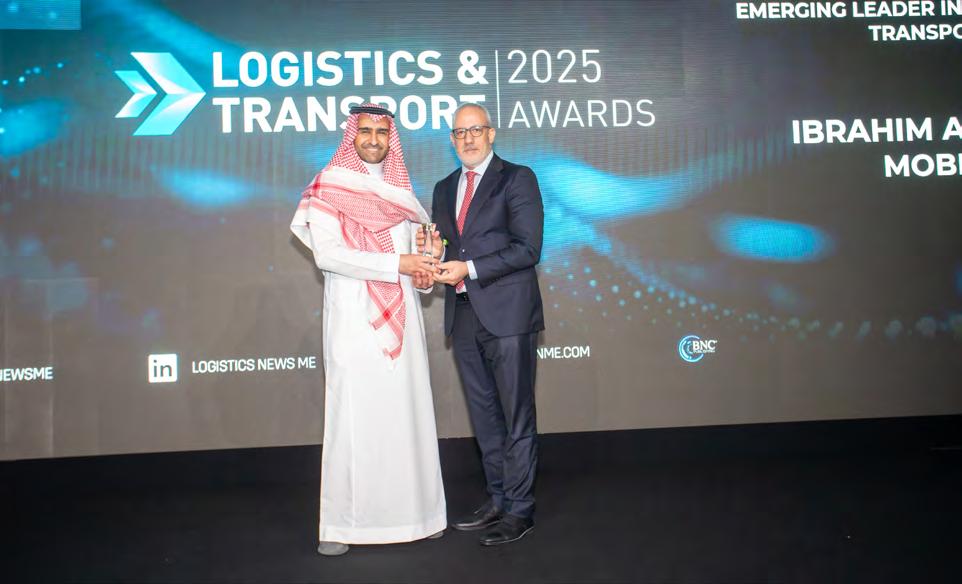
This award celebrates a rising star driving impactful change in supply chain and logistics. Ibrahim led a major ERP transformation, secured key ISO certifications for his company’s warehouse, and pioneered nationwide recycling initiatives for data-center batteries. Through strategic integration of courier platforms and operational optimisations like 3PL transitions and manpower outsourcing, he delivered significant cost savings and efficiency improvements.




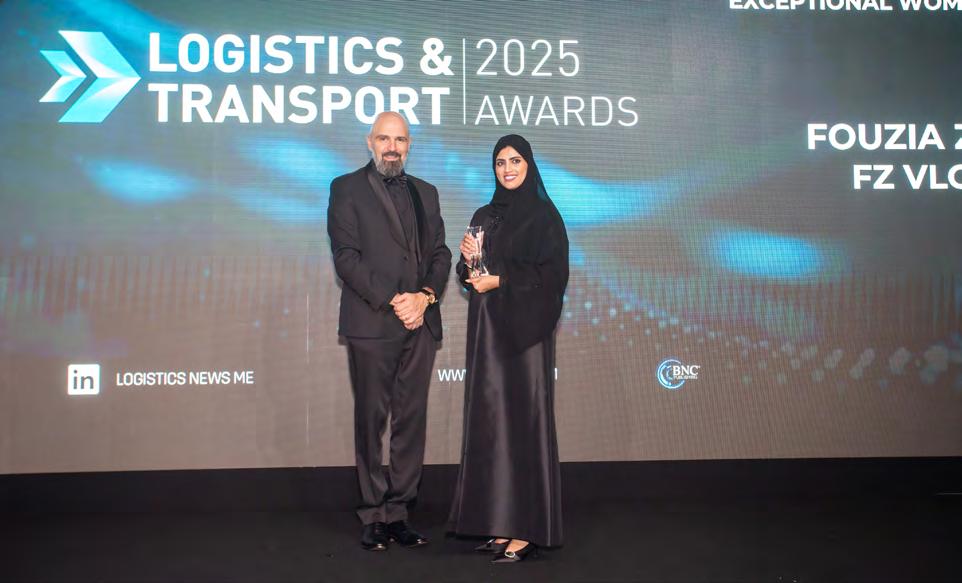
Fouzia has shattered ceilings in a male-dominated field, becoming the youngest woman in the UAE to earn a heavy vehicle license—and she did so by passing the test on her first try, with no shortcuts. She drives a 22-wheeler across long routes, handling heavy loads, all while maintaining safety, skill, and consistency. Alongside her driving, she uses her voice—through social media—to inspire women and challenge stereotypes, proving that passion, courage, and determination can drive change.


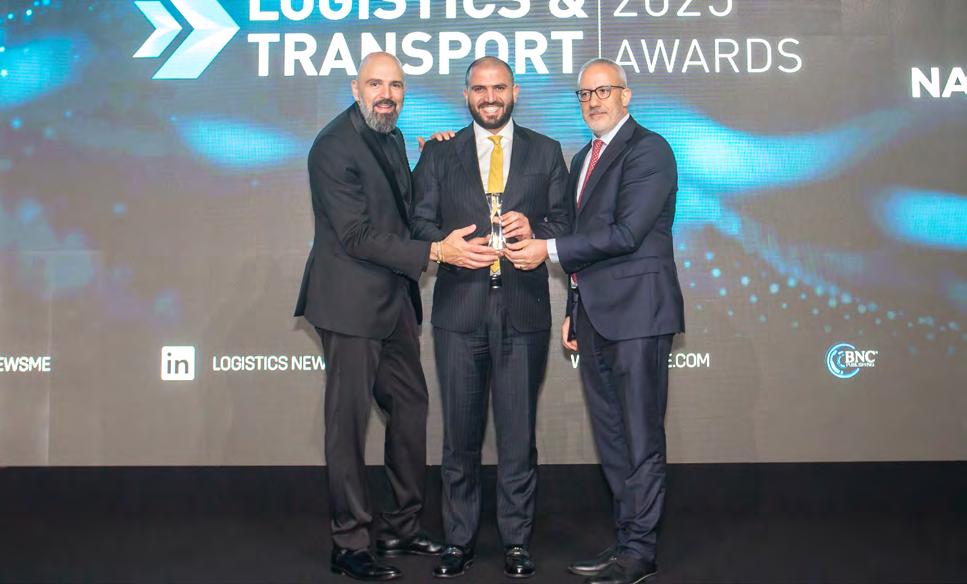
Nabeel is a distinguished leader whose decade-plus experience at global giants like Aramex, FedEx, and AJEX has been defined by transformative vision and impact. Under his guidance, his current company has grown into one of the UAE’s fastestexpanding integrated logistics providers. His dynamic leadership and innovative approach are setting new benchmarks across the industry.




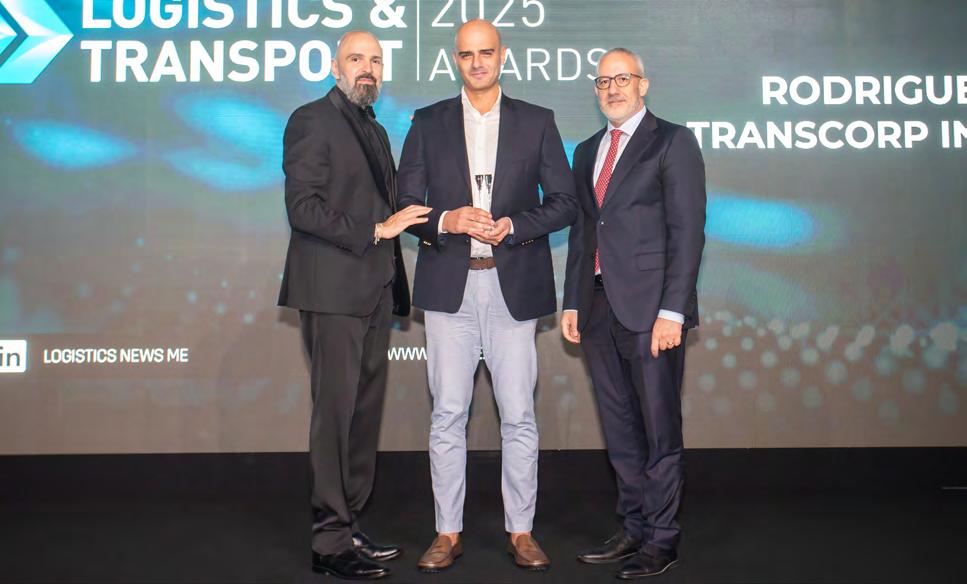
RODRIGUE NACOUZI, TRANSCORP INTERNATIONAL CEO OF THE YEAR
Rodrigue’s vision and drive have transformed a logistics company from humble beginnings into a powerhouse. With 40% year-on-year growth, expansion into multiple GCC markets, and pioneering innovations like Q-commerce infrastructure and cold chain reliability, this CEO has reshaped the industry. Under his guidance, the fleet has grown from just two vehicles to over 1,000, handling more than 50,000 daily deliveries.


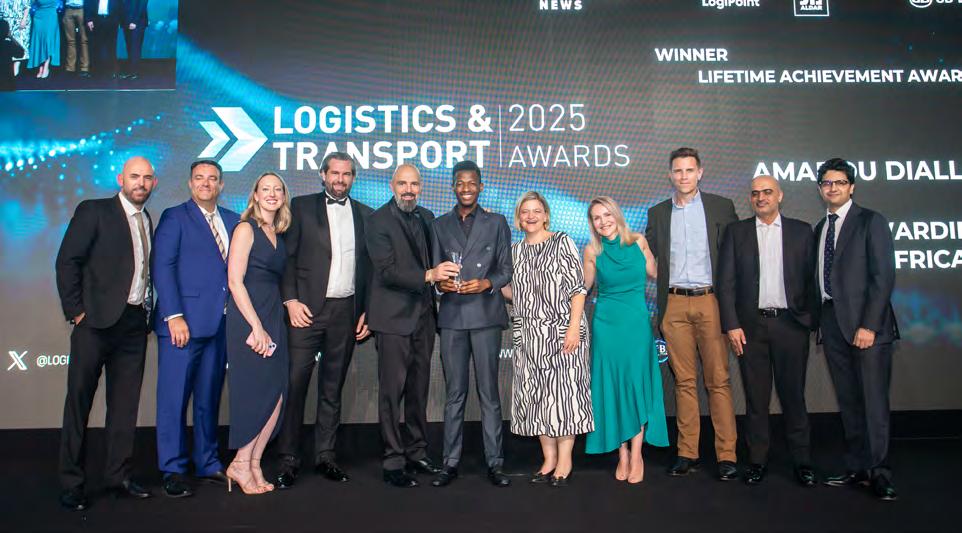
Over three decades, Amadou built one of the most globally impactful careers in logistics—leading air and ocean freight operations across the Middle East and Africa, expanding the company’s footprint across Asia, and managing high-level strategy at global HQ. Starting with night shifts while funding his own education, he rose to CFO by 27 and now drives a 4,000-person operation across one of the most complex trade regions in the world. Beyond business, he’s a mentor, a six-language speaker, and an active force for gender equality and education in underserved communities. His career is proof of grit, global influence, and transformative leadership.




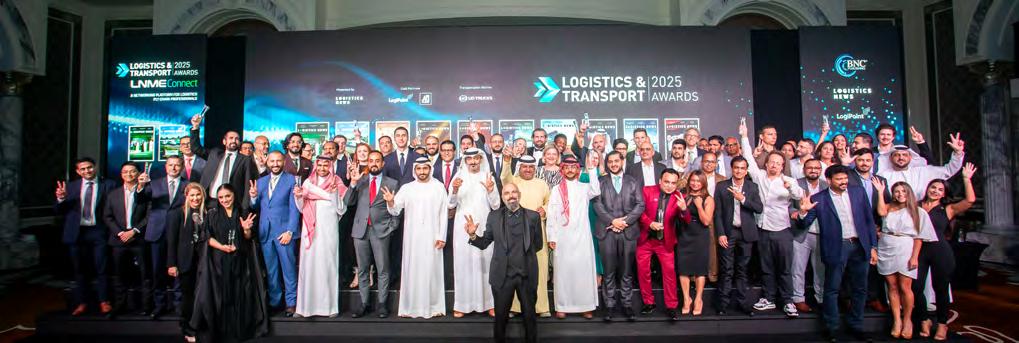
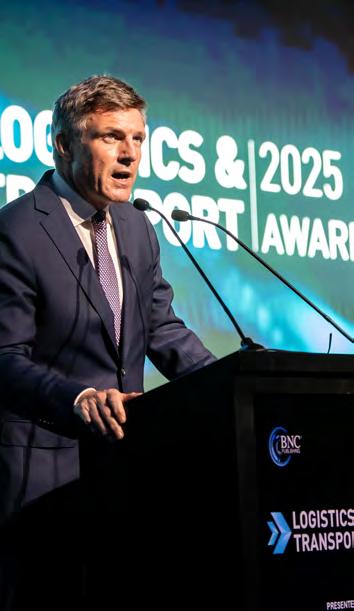
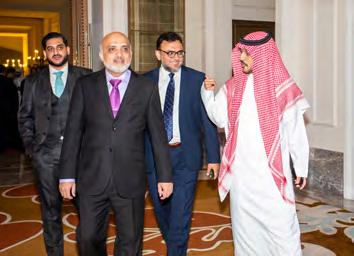
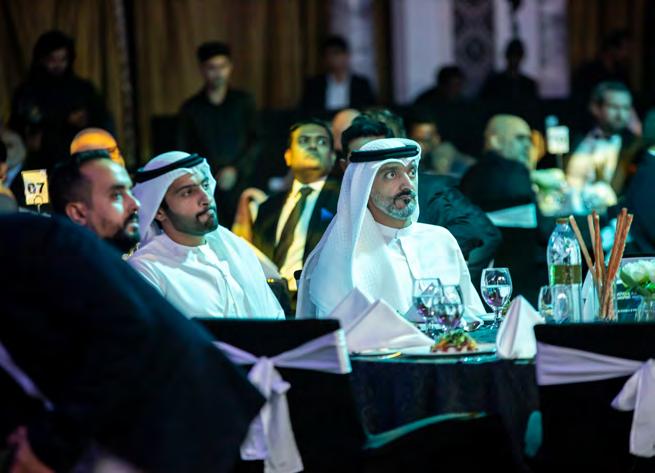
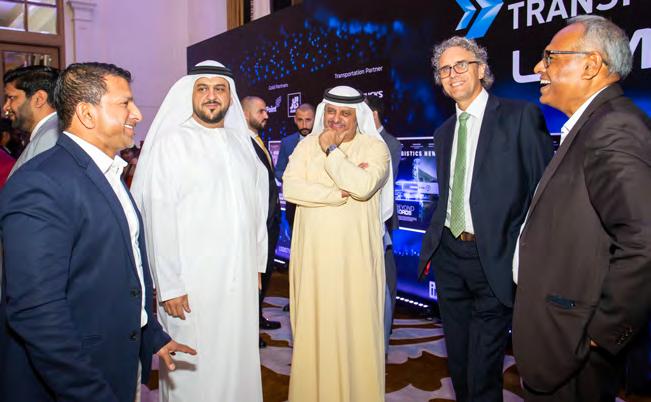

The ADNEC Centre in Abu Dhabi buzzed with energy as Global Rail 2025 kicked off, the region’s premier transport and infrastructure exhibition and conference, now in its second edition. Under the theme “Driving the Future of Transport and Global Connectivity,” the event brought together over 200 exhibitors across 14 sectors, more than 24 ministers and delegations, and national rail operators from around the world.
At Global Rail 2025, Qatar’s Ministry of Transport outlines its vision for sustainable, smart, and interconnected transport networks across the region 20 25
Under the patronage of His Highness Sheikh Mansour bin Zayed Al Nahyan and inaugurated by His Highness Sheikh Theyab bin Mohamed bin Zayed Al Nahyan, the opening ceremony set the tone for bold announcements and global collaboration.
Across four halls, with national pavilions from countries like Qatar, Korea, India, and more, attendees engaged in roundtables, technical sessions, and innovation showcases. The event’s Innovation Hub, global finance pavilion, and youth hackathon added fresh momentum, offering a platform for emerging voices in rail, mobility, and smart infrastructure.
At this year’s Global Rail 2025 conference in Abu Dhabi, Mohamed Radwani, Public Transport Regulations and Policies Section Head at Qatar’s Ministry of Transport, shared key updates on the country’s public transport infrastructure — and what’s next for one of the most rapidly evolving networks in the region.
“This is our second year participating at Global Rail, and we’re happy to be here representing both the Ministry of Transport and Qatar Rail,” Radwani said.
The Ministry’s presence reflects Qatar’s growing emphasis on regional collaboration, knowledge-sharing, and futureforward mobility planning, particularly as the country accelerates its green transition.
Following the 2022 FIFA World Cup, Qatar’s Phase 1 railway
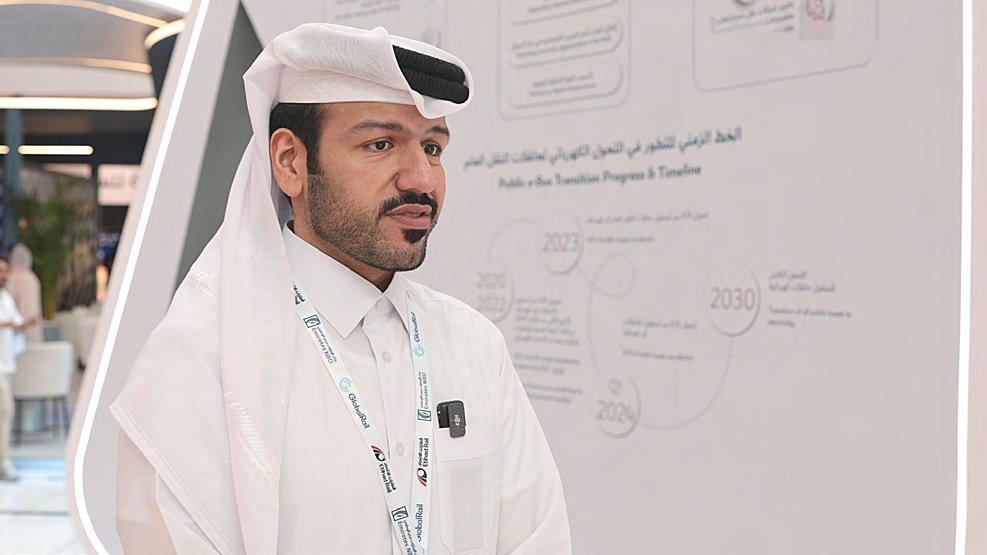
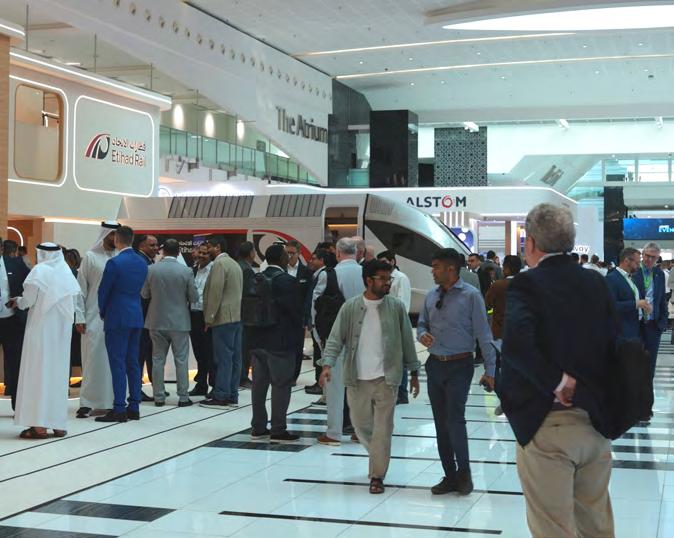
infrastructure has proven itself on the global stage. But Radwani makes it clear: that was just the beginning.
“We had everything ready for the World Cup. Now, we’re looking ahead to Phase
2, which will expand in the upcoming few years,” he explained.
Supporting this is the Metrolink system, designed to ensure seamless first- and last-mile connectivity, an essential piece of the puzzle in creating a fully integrated public transport ecosystem.
One of the biggest priorities today? Electrification.
As of Q1 2024, Qatar has electrified 73% of its public bus fleet, with a bold target of hitting 100% by 2030. But it’s not just about buses.
Radwani spoke of a nationwide master plan that incorporates multiple modes — rail, bus, scooters — all aimed at becoming environmentally sustainable and digitally enabled.
“Our aim is to make every part of the public transport network smart, efficient,
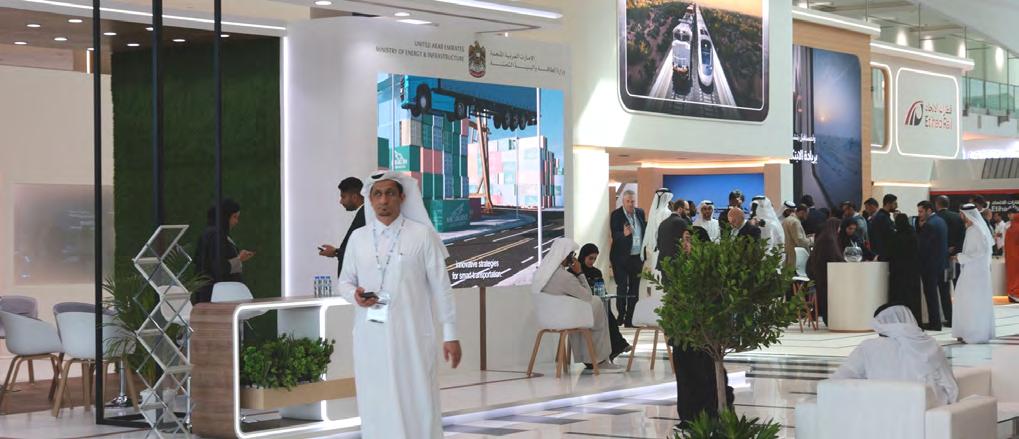
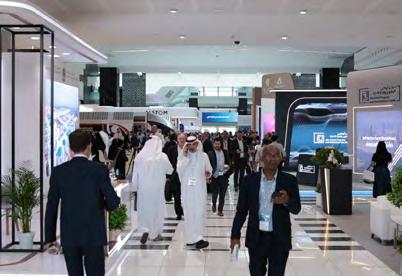
and user-friendly — while also reducing carbon emissions and supporting national sustainability goals,” he said.
Beyond Qatar’s borders, all eyes are also on regional integration.
Radwani hinted at the
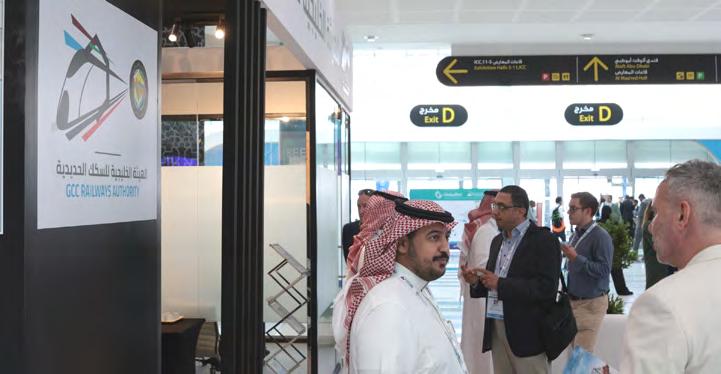
highly anticipated GCC railway project, which aims to connect Gulf countries through a unified rail system.
“It may take a few more years before we see official announcements, but it’s definitely on the horizon — and it’s something we’re looking forward to,” he added.
Qatar’s transport sector is quietly building a future where mobility is cleaner, faster, and smarter — not just for major events, but for everyday life. With a vision rooted in sustainability, regional cooperation, and innovation, the country is positioning itself as a model of modern mobility in the Middle East.
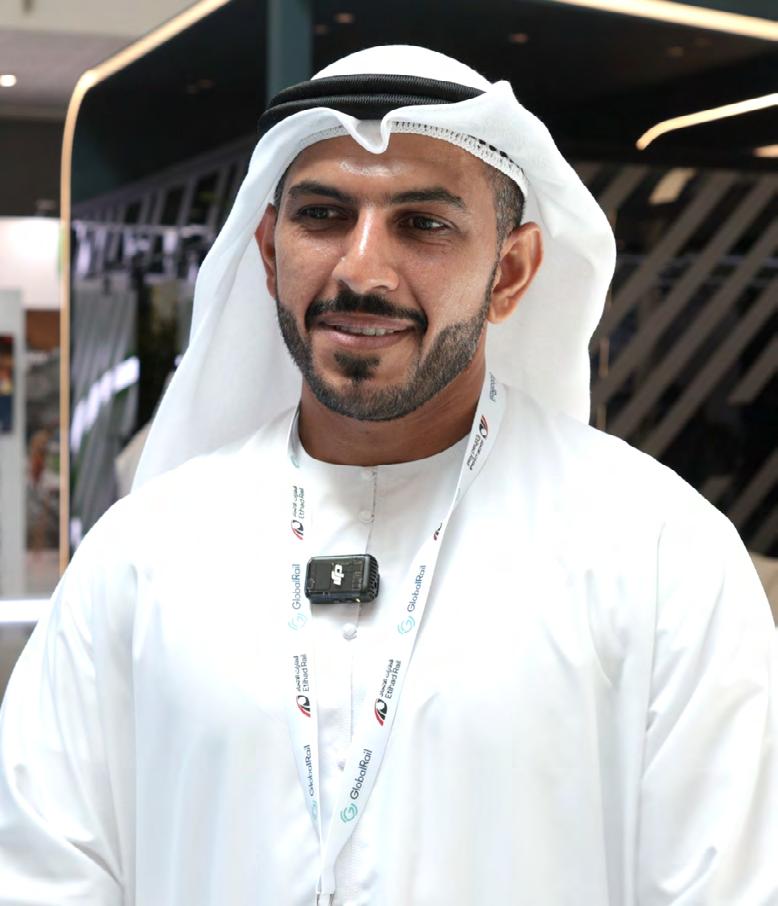
Executive Director of
At Global Rail 2025, H.E. Mohamed AlSuwaidi, Executive Director of Financial Affairs at Abu Dhabi Projects and Infrastructure Center (ADPIC), shared how the newly formed entity is shaping the infrastructure, transport, and housing sectors for generations to come
As one of the newest government entities in the capital, the Abu Dhabi Projects and Infrastructure Center (ADPIC) is stepping confidently onto the global stage. Representing the organisation at Global Rail 2025, Mohamed AlSuwaidi made it clear that the center’s presence at such events is not just
symbolic, it’s strategic. “We are very honored to be part of this global event that has all the leaders in the industry from all around the world,” AlSuwaidi said. “As a newly established center for Abu Dhabi, it’s very important to have our identity known to the strategic partners we have.”
ADPIC currently oversees more than 600 projects across Abu Dhabi, with a combined value of around AED 200 billion, a staggering figure that underscores the importance of forward planning, efficient execution, and global collaboration.
“These investments are very important for the strategic and vision of the leadership of Abu Dhabi,” he said. “Therefore, it’s very important for us to connect and build relations with all these strategic partners and see the latest industry trends that can help better plan our transportation sector.”
While ADPIC is tasked with wide-reaching responsibilities — from transportation to education, housing, and social
infrastructure — its goals are united by a shared commitment to sustainability and futurereadiness.
“One of the main goals for ADPIC is to have sustainability and build cities that are future-based and have all the infrastructure needed for the future generations.”
This ambition is already being realised through major investments across sectors. Most notably, AlSuwaidi pointed to the recent announcement of over AED 100 billion allocated to housing projects, resulting in
more than 40,000 new units for Emirati citizens.
“In the transportation sector, we are investing a lot into the projects to enhance the infrastructure… in the Mussaffah area, the South Island, links to Saadiyat…” he explained.
What stands out in ADPIC’s approach is its integration of innovation from the very beginning. AlSuwaidi highlighted how projects are not just about building for today — they’re built to anticipate tomorrow.
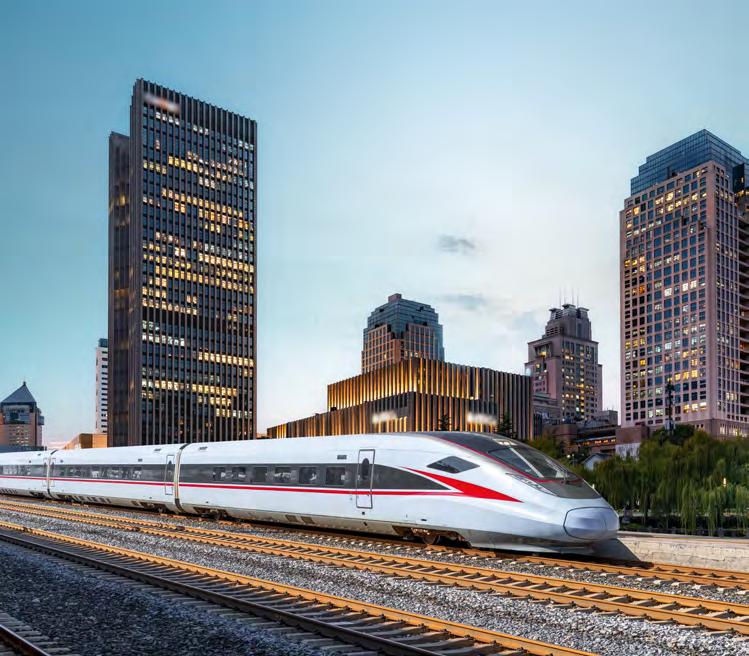
“All these projects are wellstudied and integrated with all the latest technologies we have,” he said. “For example, the air taxis, the IOT, all the latest trends we have. This infrastructure is well-built on that.”
To ensure this vision stays aligned with rapid advancements, ADPIC also has a dedicated innovation team, focused on identifying and incorporating the latest trends into infrastructure design and planning.
“We have an innovation team that looks into these trends and makes sure that Abu Dhabi investment in the transportation sector captures all these and builds a very solid foundation for the future projects and the wellbeing of the community and the city in the future.”
As Abu Dhabi continues to shape its future through longterm investments and smart infrastructure planning, ADPIC is positioning itself as both a custodian of vision and an engine of execution. With a growing portfolio and a clear mandate rooted in sustainability, innovation, and strategic collaboration, the center is not merely keeping pace with global trends. It is helping define them. Through initiatives that look beyond immediate needs and build with future generations in mind, ADPIC is laying down more than roads and rail. It is laying the foundation for the capital’s next era.
